#though if i have to sacrifice that for characters being able to be depicted without their gloves. it'll be worth it
Explore tagged Tumblr posts
Text
OH YEAH I SCREAMED WHEN I NOTICED THIS, in this pic of the moment shadow first woke up, HE ISN'T WEARING GLOVES!!!!!!!!

OFFICIAL IMAGE OF A SONIC CHARACTER WITHOUT THEIR GLOVES IN 2024, WE ARE SO FUCKING BACK!!!!!!!!!!
#DEATH TO THE MANDATES DEATH TO THE COLORS ERA IN SHADOW BARE HANDS WE TRUST!!!!!!!!!!!!!!!!!!!#serena.txt#sxsh spoilers#sonic x shadow generations spoilers#shadow generations spoilers#also interesting that he isnt depicted here with the red stripe going down onto one finger like most ppl draw him#his hands just look fully black. we dont see the underside though so maybe there's markings there#also means i can live in my world where they have full on paws with beans at least a little longer#though if i have to sacrifice that for characters being able to be depicted without their gloves. it'll be worth it#edit: the steam/smoke from the pod actually obscures things - you can see his stripes disappear under it elsewhere#so hand stripe truthers still have a chance
81 notes
·
View notes
Text
Upon rewatch, I interpret Mytho as aromantic. He’s established as the Prince who selflessly cares for everyone, so I read him as having a lot of kindness for others but not so much platonic. And there was also the episode with the anteater who stole him away as a dance partner from Rue (yes I know he didn’t get all his heart shards yet).
But even at the end, when he chose Rue as the princess, it didn’t really seem like he fell in love with her romantically to me? Like he was always a storybook prince. It felt like he was merely following textbook fairytale convention rather than genuinely being in love with her. (Though I’m pretty sure the guidebook from years ago confirmed this as romantic, so this is completely not canon).
But also I just like the idea of a Prince who has enough love to give to his kingdom, and he doesn’t need romance. I just really wished there’d been a third season depicting him with more heart shards that explored what love is and different ways of loving. And what even constitutes as love.
We see a lot of different types of love throughout the different characters. Rue/Kraehe has a selfish romantic love in how she wants to monopolize the prince all to herself. Her love is all-consuming but it flips at the end when she chooses to sacrifice herself for him.
Then this contrasts with Ahiru/Duck who selflessly admires him. She doesn’t get jealous about Rue or other girls being with him. Hers stems from goodwill and just a desire to have Mytho smile. But it’s flipped at the end as well since she doesn’t want to return to being a duck, having grown attached to her human state.
You have Drosselmeyer who operates out of love for tragedy. He doesn’t care what happens as long as he gets a good story out of it. Even at the end, he basically shrugs off his defeat and continues in search of another story with Uzura. For him, it’s not about riches or conquering the world or anything material—it’s all the love of storytelling.
Then you have Fakir and Autor who love Ahiru/Duck and Rue romantically (based off guidebook scans). It’s presented as basically unrequited with Ahiru returning to a duck and Rue running away from Autor. But both of them were willing to lay their lives on the line for the girl they wanted.
EDIT: I feel like it would make for a very interesting post-finale fic to further explore Mytho as an aromantic Prince hero as he adjusts to having free will + all his heart shards. Like it’s a turnaround on the “villain can’t love” trope. Now you have the villain (Rue/Kraehe) who becomes the villain because of love until she’s redeemed with selflessness. Then you have the perfect prince who is enduringly selfless but doesn’t fall in love. You’ve had multiple people over the course of Princess Tutu sacrificing themselves (or willing to) out of love, but he was already selfless without it.
And it’s Mytho struggling to break free of his role in fairytale convention. Since he’s always played the Prince role and was accustomed to how fairytales required him having a princess. Even with his heart intact, he was always under Drosselmeyer’s control due to being in the story and his life’s always been run by fairytale expectations. And then he realizes that now he’s completely free for the first time and is able to truly shape his own identity.
#aromantic#Princess Tutu#Mytho#ptutu#headcanon#ahiru#fakir#autor#drosselmeyer#just a couple ramblings and thoughts
13 notes
·
View notes
Text
Like I feel like 90% of my problems with 423 (Izuku) could have easily been fixed if Hori had actually stayed true to Izuku's character as someone driven by his empathy for others. Naturally I would have still been extremely upset with Tenko's death, yeah, but I think I would have at least been able to gradually process it and eventually accept it if Hori had actually depicted Izuku as like... actually reacting to the fact that he's killing Tenko and actually attempting to grapple with the weight of taking his life. Any reaction that might come after this chapter is simply too late to undo the damage.
Blood+ is an excellent example of a well done "I had no choice but to kill you" villain death: In this series, The hero (Saya) is ultimately forced to fight and kill her villain (Diva), but the core of her character-- her kindness-- is never sacrificed. It's enhanced by the tragedy of it all, of her being forced to end a life when she sincerely didn't want to. Even though Diva did terrible and unforgivable things, the first thing Saya does when she sees her crumbling is to rush forward and comfort her despite her own injuries, and to express intense anguish over not being able to help her. This cements why Saya is the hero of this story. I haven't watched Blood+ in over ten years, but the final moment between these two is something that has stuck with me all this time-- this is how you write a powerful ending between your kind/empathetic MC and the villain they were ultimately forced to kill.
Comparatively, everything about Izuku and Tenko's resolution feels completely numb. Izuku's lackluster nonreaction to everything he learned about Tenko in the vestige world. His complete lack of distress when Tenko's abuser swallowed him up and took over his body again. Him not expressing any concern for Tenko's safety once AFO resurfaced. Him continuing to beat on Tenko's body as it crumbled without any internal conflict or hesitation.
All of it sacrifices the very foundation of Izuku's character-- him being moved to act out of EMPATHY for others, not out of a desire to simply "beat the villain". The climax of Izuku's long awaited "rising" chapter is ultimately about him punching someone rather than saving someone, which also betrays the core of his character (yes, it's also about how he inspires others by doing his best but can you honestly say him rushing forward to punch TomurAFO to death was "doing his best as a hero". What was supposed to be the cumulation of Izuku's arc ends up being completely surface level/lacking sincerity and instead reads like Hori is just going through the motions).
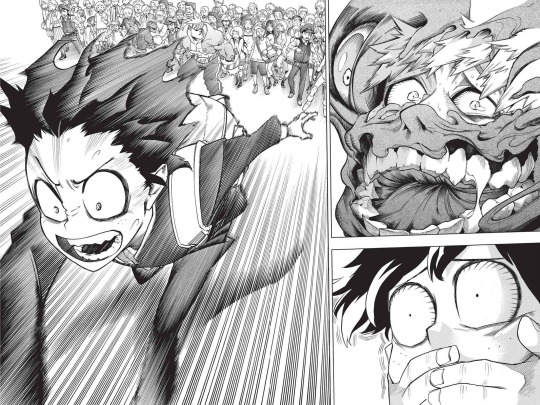
The boy from chapter 1 whose body moved on its own after seeing someone in pain was ultimately more heroic than the boy from chapter 423, and that's one of the many reasons why people should be upset with this chapter and what it's done to Izuku's character/arc.
#among the multitude of other bad things about it#mha spoilers#negativity/#sophie.txt#tenko dying still absolutely wrecks the series themes even in a parallel world where Izuku did have an actual reaction 2 having to kill him#mha 423#shimura tenko#shigaraki tomura
71 notes
·
View notes
Note
Hey how do you feel about todays dual rulers episode I’ve asked a couple of people and opinions have been a mixed bag so I’m curious
I liked it but I’m really biased towards liking it because sin kiske
i was just about to post about it lol
here's my general thoughts + my new theories
spoilers for Dual Rulers:
its an episode where it felt very exposition heavy (like everything was plot related but not a lot of action). there were certain narrative threads they had to get through and thats kind of what the whole episode felt like. the ep went by so fast for me i was shocked when it was over, it felt like not much actually happened bc it didnt. Of course I luuuuv Sin, he's just so much fun to watch. AND I'M GLAD ELPHELT IS OKAY LMAOO.
the scene with Bridget and Unika aaahhhh 😭😭 it felt so beautiful and yuriful to me i loved that. i wont dig into that rn though.
I love this moment with Sol where he says he was trying to protect Sin from Unika. He cares so much for his boy. He wasn't necessarily doing what he did for the good of everyone, unlike what Sin would do.

Sol is seen making decisions with harsh consequences to protect people he loves-- it reminded me of when Sol was willing to sacrifice the world to save Jack-o.
we also got some new revelations though. Unika is pretty much confirmed to be a time traveler from the future (I WIN MY THEORY WON). Sin is confirmed to be the king of the gears in Dizzy's absence?!?! HONESTLY thats insane to think. WHAT DO YOU MEAN HE CAN JUST COMMAND THEM TO KILL THEMSELVES 😭

Obviously Dr Paradigm would probably argue against that, nor do I think Sin would want to do this.
I'm kind of getting the sneaking suspicion that Sin is the cause of second Crusade they spoke of in the future. One of Sin's virtues is that he values life and avoids immoral action-- but the flip side is that he refuses to make any compromise against morality, even if that possibly means endangering even more lives. Not that he's wrong for this, but i envision his good actions having unforeseen consequences. Not to mention, if Sin loses control of his powers, that's likely to be very destructive. Please i really want evil Sin PLEAAAASE. let him suffer for a little bit. Sin is also pretty naive and the fact he thinks he could just stop another Crusade without having ANY reason to back that up, really underscores that naivety, and i think that's gonna bite him in the ass.
Time travel narratives often loop back around so, maybe future Sin, if there is one, is involved in Unika's reality and that new Crusade. I'm also still pondering who her father could be. I think it will be a future version of a character we already know. Hear me out... Gear Maker That Man 2.0. The shadowy nature of this guy just reminds me of the older depictions of Asuka. It's making me wonder.
and an observation about Unika. her powers all seem to relate to animals(gears by extension, since theyre made with animal dna): wings = bird, camouflage = chameleon. Yes the wings feel so similar to Dizzy, but they're a bit off. They feel digital, same with her cloaking. My theory is that Unika's is able to mimic the abilities of gears, using advanced technology. We learned that Unika and whoever she is working with, possess technology not of this era. It's very advanced, with her being able to make a copy of the weapon key just by coming into contact with it for a bit. Who knows what else that technology can mimic? and coming from a time where another Crusade happened, I'm sure they had developed some anti-gear tech.
Could Unika be working with Nerville Hammer? I was hesitant to say at first, bc it seemed too convenient that Unika and Nerville showed up at the wedding together. It seemed like a red herring. But if Nerville was working on anti-gear tech, maybe his research became VERY important in the future, leading to some of the tech that Unika's possesses.
Another point pops up: why are Unika and Sin so similar in their fighting style and powers? If Unika is not directly related to Sin, she might be augmented with Sin's (AND maybe Dizzy's) DNA, to be a kind of super soldier. There's mentions of her life being more special than others, so there is something that makes her uniquely important. Perhaps she has command gear blood in her. Maybe she wasn't born that way? Or maybe she was.
We know Nerville took Dizzy's and Sin's DNA-- likely because they're both Command Gears -- and maybe that was to ensure that in the future humanity had a back up plan against the gears.
This seems to imply that Unika and Nerville are working for the same people, some coalition that has yet to be revealed. I'm excited for that.

#i dont have access to the ep RN so im just going off what i remember#dual rulers spoilers#dual rulers#guilty gear#guilty gear spoilers#asks#clampost#dual rulers theories#dual rulers episode 4
17 notes
·
View notes
Text
arcane spoilers. not about anyone i follow or interact with but really just a mini meta. another word that fandom has lost the right to use (alongside gaslighting and child-coded) is "fridged".
okay so. when a male character's wife is fridged for his development, we understand that the writers don't want to write her--usually due to their misogyny, or that writing an oppressed character would require research/time/effort that a regular ol white guy does not (in short, their laziness). in the case of fridging, they're using an oppressed class or person (usually a woman) to further the development of the more privileged character who lived (in this example, the regular ol guy who lives). we understand that it's an inversion of the trope when a husband is fridged and the wife lives instead, because it's turning the misogyny on its head; the woman escapes the fridge but her husband does not, and it's her story this time, not his. we understand that it's subversive to have the character who is less socially acceptable to write live. a white cis woman with a dead white cis husband is not typically considered fridging, right? for example, though it's a father-daughter relationship, silco dies for jinx's development (both negative and positive) and we can accept that. another example is vander, who dies for the development of multiple characters.
so with all of that in mind regarding the complexity of a character being stuffed in a fridge. fridging does not apply to viktor and sky. because sky is able-bodied, and viktor is not. narratively, her death is necessary in order for viktor to stop augmenting himself (though season 2 forgot about that tidbit completely but that's another post). do i think we should've had more time with that? that sky should've been allowed to do more? for sure! we can definitely criticize her minimal role in the narrative! but the fact remains that in any other narrative, viktor's death would serve to motivate a character like sky or jayce, because that's often the role disabled characters are relegated to in media: a tragic, untimely death to make the able-bodied characters sad. disabled characters are frequently fridged. we see this in media like me before you, for example, in which the male disabled character is fridged for the love interest's pain. is that reversing the trope because he's a man and she's a woman? of course not. it's ableism and the gender swap doesn't solve that problem.
what is so unique is that in viktor's case, the disabled person lives, the able-bodied person dies. she chooses to do so, albeit blindly, because she loves the disabled character and hates to see him in pain. that is subversive. it's as subversive as a wife who survives her fridged husband. except nuance no longer exists in fandom, so people see a woman who dies in a man's narrative and yell about fridging, without considering that viktor is a disabled, queer-coded character who would be killed off unceremoniously in any other story. there are many many problems with the depiction of disability in the show, but viktor being loved to the point of self-sacrifice by the able-bodied characters around him is not one of them.
tldr sky deserved more in her narrative, and an able-bodied person dying for the disabled person who they love is extremely subversive and meaningful, are statements that can co-exist!
#ooc.#file : viktor.#headcanon : viktor.#i have my own beef with arcane writers but this is not part of it#the unfortunate truth is that sky was always going to be a woman because of the anti-mlm sentiment from the writers#and thats an unavoidable difficulty of a narrative like vik's#someone needs to die to show viktor the hexcore is dangerous. idk if it wouldve been any better if theyd made sky a man#because then its kill your gays#the best thing wouldve been for her to have more to her character in the first place#yeah yeah she comes back in s2 kind of but s2 is a dumpster fire of ableism so we're not talking about that
8 notes
·
View notes
Note
Hi there, I was rereading your Maki Zenin fanfic (Tyler Durden and the Culling Game piece). I must say when I read it the first time reading it, the way you depict her mentality, emotion, and actions. It was so emotionally draining and at the same time cathartic as it reminded me of myself back then and now still (well minus mass murdering all lotta people). But also surprised me, cause I have never this depiction of her after Shibuya Incident. But over time as I look at your analysis on various characters and paid attention to her upbringing by rereading the manga chapters focused on her, I realized the way she behaves in the Culling Games after what happen to her throughout her life. She is kind of stable??? Regardless, even though she is already my all-time favorite character. Your depictions of her makes me love her character even more as I actually relate to her more and felt those similar feelings. But I'm glad she is alive and is doing ok near the end of the manga, so I wanna ask. What do you think about her character now since JJK is VERY close to its end? And how do you feel about where she is right now as of Chapter 269. Sorry for the long ramble, I might ask more lol.
Thank you so much for your ask! That reminds me I need to start updating my culling games fic again sometime soon. For anyone curious the ask is about THIS YUTAMAKI FIC HERE.
Maki's kind of a hard character to talk about because even though Maki is clearly one of my favorite characters to explore in fic, and I love to dive deep into her motivations and inner struggles in the fanfics I write every time I criticize her writing in canon a little bit her fans jump me.
So instead I'm going to share one recent Maki scene I really liked, and one little tweak I think would have made both Yuta and Maki's character endings perfect.
You're right, for a lifelong abuse victim who just murdered her family Maki seems oddly stable all throughout the culling games. I no longer think this is a Maki specific problem, but rather a Jujutsu Kaisen problem. Basically, post Shibuya most of the character conflicts in between characters are dropped so everyone can work seamlessly together as a part of one big team.
This is a storytelling choice on Gege's so he could eventually set up for the Shinjuku Showdown fight, it'd be impossible for everyone to keep jumping in and out of the fight if people kept stopping to argue and have interpersonal conflicts in the middle of it.
If your name wasn't Megumi or Yuji, then basically all your personal hangups, your self-reflection, all got dropped. Which now it kind of makes sense why the audience was yelling at Megumi for not being able to immediately get over his sister's death, like in comparison none of the other characters spend any time at all dwelling on personal issues because Gege needs them to move to the next fight.
I'm not complaining, I'm just saying this is how Gege chose to write his characters post Shibuya, most personal conflicts got dropped for story reasons.
However, there was one moment that made me really get on board with Maki's writing again, and it was a... you guessed it moment of personal conflict.



This moment where Yuta is bringing up the idea of body swapping with Gojo before the group, and Maki despite being firmly against it is unable to do or say anything substantive to stop Yuta.
It's the first time I've seen that yeah, Maki is still in fact reeling from the loss of Mai. It doesn't really show most of the time on the surface, but Maki's always been like that - like an island able to stand strong without the support of anyone else. It is her strength, and also her greatest weakness.
Remember, the last time someone she loved walked away from her and decided to sacrifice their body and autonomy so they could become a weapon for the greater good Maki wasn't able to say or do anything to convince Mai to stay with her and stay by her side too.


There's the parallel with Maki and Sukuna, that Sukuna chose to devour his own twin in the womb in order to survive and therefore gained a body perfect for sorcerery. When Mai died, Maki gained a body just like Toji's.
Maki carved everything away in order to become a true void, but unlike Sukuna she didn't do it by choice.

We know she wouldn't willingly sacrifice Mai. She begged Mai to stay. Yet, she kind of did choose to sacrifice Mai with every choice she made before that. Maki chose being a Jujutsu Sorcerer over Mai every single time, to the point where when it counted she couldn't do anything to convince Mai to stay.

Maki consumed her twin and became a monster like Sukuna, a true void. She didn't choose to do it per se, but every choice she made leading up to that point indicated to Mai that Maki would rather be strong on her own then weak together with Mai. That Maki is someone like Gojo, and like Sukuna meant to stand strong all alone. Maki is an island and that is her greatest strength and her greatest flaw.
As when it happens again and someone she loves is about to become a monster, she can't find the words to convince Yuta to stay with her on the beach instead of walking into the ocean the same way she couldn't find the words to stop Mai. After all, Maki is someone who chose to become a monster like Toji after losing everything else, what right does she have to stop Yuta from becoming a monster too?
How could she possibly stop him from walking the path she walked? I think it's telling to thde depths of her love that Maki who values being a sorcerer above everything else, would have rather had both Mai and Yuta stay human and stay with her, but also telling of her complete inability to express that love.

It's "You're too important to us" because the words "You're too important to me," doesn't occur to Maki in both cases with Yuta and Mai, because Maki is an island. She can keep going on even after Mai and Yuta are gone even if she doesn't want to.
So here is the one change I would make the Maki's endgame to make her and Yuta's character arcs perfect. I would just have Yuta not be able to come back from Gojo's body. Otherwise, Yuta being magically fixed after the fact makes that whole plot twist kind of inconsequential and as much as I love Yuta in Gojo's body it kind of just seems to exist for shock-value now considering how easily it was resolved.
Yuta not coming back would provide a consequence for Yuta defiling Gojo's body, and also in general give the perfect bittersweet ending to both him and Maki's arcs. They both chose to become monsters in the end to defeat Sukuna, and as a result Maki is standing alone at the strongest. It would also provide the perfect parallel to this scene with Geto and Gojo. You could even have Maki musing on how she was left behind again. There's a pretty big parallel to Maki and Gojo both being people who seemingly don't need anyone because they're so strong and self-sufficient and yet they crumble at the idea of the one person they've always been relying on walking away from them.

It would also parallel Megumi and Itadori as well, because the reason that itadori is eventually able to reach Megumi is specifically because unlike everyone else he refused to give up his humanity to defeat Sukuna.
You could have a really heartbreaking parallel of three generations of friendships broken apart by the Jujutsu World. Satosugu, and YutaMaki aren't able to reach each other and stay together, but finally by never giving up on reaching out towards one another Megumi and Itadori are both able to find each other again after the world and Sukuna pulled them apart.

I do enjoy this scene a lot - especially the parts where Maki seems borderline arrogant by insisting she could have done things all on her own and if they went with her plan instead of Yuta's then they would have suffered far less losses. Especially since Maki's not genuinely trying to chew Yuta out here, she just knows no other way to express her worry over him besides being hyper aggressive and confrontational.

It still shows that Maki's personality problems are all still there, she loves people a lot but she loves people from afar and can't admit to needing them but like I'm just saying we could have had THE UTLIMATE DOOMED LOVERS ending for YutaMaki.
#metasks#maki zenin#i'm not criticizing maki at all please don't jump me#yutamaki#maki and gojo are some of my favorite characters i s2g#and yet i get a reputation for being a hater#i thought we were supposed to torment the characters we loved#isn't that what all fanfic writers do?#yuta okkotsu#nobody dies au
30 notes
·
View notes
Note
Sooo...what is Eli? Not sure if you've answered this anywhere else before...They're some kind of eldritch abomination right? Could you elaborate on that?
I wouldn’t go that far as calling him eldritch abomination idk why… that sounds too great of a title? their dad is one tho. I will point some of the characteristics of eldritch abominations and if Eli has those or not because i'm not sure myself, also i'm not an expert this is for fun and don’t have a lot of info about it so blehhh):
(LONG ASS POST BELOW OMFG) (cw for slight body horror talk like always, murder mentions too, also my bad writing and punctuation yeyy)
The problem with Eldritch abominations is that it’s difficult to visually depict them since it’s better when they lack form, when you look at it you lose fear, they become comprehensible in a visual way if it’s not moving or difficult to find a form that produces the fear of the unknown or possible threat). There is also the feeling of fear that comes with looking at those entities, it can have an explanation or just be triggered by the fact that the creature is breaking reality, but with Eli is just a little uncomfortable feeling in people, nothing maddening. Eli has a recognizable form even if it's changes a lot, so it loses that touch a little bit. I personally don't find her monster form that horrible, for me it's more on the cute side (-1 point for Eli booo tomato tomato tomat-)
Eli reshapes reality in:
Themselves, their own code with their physical form, but they do this without touching the code in a manual/direct way, their own willingness produces a change in it. Also their ability to disfigure, reshape or alter the body of others and change their code can be an example too.
The surroundings (against Eli's will), it gets affected because they are something that shouldn't exist or doesn’t belong in that reality (and that’s what they feel, it’s like a materialization of their thoughts in a sense; im not saying their mind has control over the surroundings, this is just a small fact). Things like terrestrial animals freezing just by being near them (this doesn’t affect humans since Eli is half human) or fish getting meters away from them (their dad comes from the sea so the creatures of that ‘realm’ know what to do, while animals of land kind of short circuit accepting their possible death). Eli also causes a small uncomfortable feeling in people, but that dissipates the more time they pass with them (ooo why ooo) so it doesn’t count (but this can be felt by other people that are ‘monsters’).
So it would be accurate in that aspect (+1 point Eli woo)
Eli’s existence also goes against natural laws as we know them. I was thinking that their existence could be explained by science in a far away future, because the thought that no one is going to be able to understand them kind of makes me sad but that’s just my personal view on them. The laws that they broke are life and death definitions (like the undead category; zombies, vampires etc), i don’t feel like explaining this right now sorry, but you can make yourself an idea with what i have said before. They also break some gravitational and physical laws (chunks of flesh floating in the air or even getting dissolved into it) anddd this is too much im leaving it there my head hurtsds (+1porintn eyeyyu)9
Eli can be killed. Difficult but possible. You just need to be smart about it. You don’t need to go to great lengths or a great sacrifice to make it happen. Some eldritch abominations can be killed, but a lot of times it's not easy to do so and requires a lot, so even though it’s not a requirement, it’s kind of meh (-1 point because yes, fuck Eli, get her ass, whathe flip)
Existing outside of reality? their reality is the game universe, but bear with me for a second. If we count Eli as in the game universe, you can see if from two perspectives: them as in the character and concept inside the game OR as the entity playing the game.
There is Eli as the character concept inside the game universe, with their background and other characters. Everything normal and fictional from here.
Aside from that we have Eli’s existence that's supposed to be outside of the game, ‘the player’, someone or something real. This would be the ‘being beyond our reality’ (the reality of the other characters), something not perceptible to the code. Actually a side note: i had an idea before that was for Eli to shape or have an impact on the code of the game through veins and flesh, but I don't want that to be in the game universe… it's just a funny thought… I'm making you lose time
Since the game has two sides to it i wanted to explain that from Eli's perspective, but the first one is the canon for my oc, the other is just an silly idea. It’s nothing out of the ordinary since it goes along the game’s themes
(+1 point but -1 point we didn’t go anywhere wohooo)
A danger for humanity? don’t get me started, yes (+1poitn ofr Elii don’tmakemetalkabouttheirdad’ssillyplannotimportant) also they kill people i already explained that before but not in detail but im not doing it here goodbye THISIS TOO LONG
Conclusion: if anyone read all that im so sorry, i hope you had time because that was a waste of it, you get a little kiss from idk anyone go claim that kiss to whoever be happy. Eli is probably an eldritch abomination to whoever deems them that way so its ok! i actually don’t call them that bc it sounds lonely, what do you mean beyond our comprehension? it will never be understood? that’s a little sad :( whathe hell. i can't deny it's sound kind of cool but I don't see Eli in that way
#🥩FleshingOut: Eli🥩#eldritch abomination#<- should i put the tw#oc#too many things to explain and i english is not my first language fuck my stupid baka life#i didn'teven explain all i wanted to. its too much#don't use this as reference for knowing what is an eldritch abomination and what not. since i don't know shit. i just searched a lil bit#that was fun tothink about but my brain feels like soup now#i like these topics bc i remember a lot of times the creator referring to Ren as an Eldritch being and now i see it with the characteristic#reshaping reality and having power on the code of the game. thinking like that it’s not so difficult to understand how he does it#if everything has a code and they are a hacker. who says our reality doesn’t work that way too.#there are a lot of things we can’t perceive. our senses have a limit and they don’t align with the limits of reality#but it’s ‘our’ reality so it doesn't really matter. its fun its 5 INTHE MORTNING GOODBEY#i need to sleep now im starting tosee stuff goodnight a litttle kiss to you tugs you to bed and passes out on the floor#thankyouoo forthe ask sorry i took long to answer aaa#🚪Ask received🚪
6 notes
·
View notes
Text
Stray Thoughts and Rambling about the Story from Oreca Battle Chapter 6: "The Desolation of The Poisonous Swamp"

Following the previous ask about the lore from each chapter, I suddenly wanted to share some lore about Chapter 6 and New Chapter 6 that I learnt from reading Demizu Posuka's Oreca Battle manga, some tidbits from the Japanese fanwiki, and some fan theories I heard and read about from Pixiv and twitter
Please do take caution since this post is mostly based on speculations and fan theories from other fans, and along with the fact that EN localization for any other New Chapter series after New Ch. 3 doesn't exist
There might be wrong speculation, wrong character names spelling, and such Please proceed with caution, thank you!
So, let's start from the established main story of what started Chapter 6

Chapter 6 story started with the appearance of Demon Emperor Tokaji who wanted invade the world of Oreca by spreading his poison throughout the land with his army of the undead
And then comes our protagonist, Shining Guardian Dia who have been blessed by the light from Heaven She went unto the journey to fight against Tokaji to save her homeland from being overrun by the army of undead
Even though the fight have ended with Dia's victory, the aftermath of the damage from the poison that Tokaji spreads on the land are very severe and left the world of Oreca in dire state
Because of this, the Heaven sent two angels to observe and help clean the land from the poison that are spreading, and to decide what is needed to be done to what have happened These angels are Clay, our main protagonist from New Ch. 6 and Camael, his best friend
And this is the start of New Chapter 6

Along their journey, Clay and Camael start to have differing opinions regarding the fate of the land and taking on different paths
Clay and Dia is on the side of who wants find a way to save the poisonous swamp without needing to sacrifice the remaining denizen
While Camael is on the side of King of Light Elysium, who wants to "purify" everything on the land back into nothingness
It is also stated on the JP Fanwiki that Elysium is actually the one who granted the power of Light to Dia on the beginning of Chapter 6
And from this conflict, we finally come to the final fight that will decide on the fate of this land


According to someone's theory, Clay and Dia are fighting for the sake of the remaining people who are still alive on the poisonous swamp, and their victory should've been able to let the people live on
Regardless of who came out as victorious from this battle, it doesn't change the fate of the swamp because of how severe the poison that have already spread throughout
And so, Chapter 6 ended with the inevitable fate of the swamp from being purified into a desert
But even after the desertification, there are people who are still living and surviving on the land Perhaps the remaining people who live in this desert is the result of Clay's and Dia's victory?
But even within the desert, a new threat looming over their fate as a demon king appears and imprison a lot of warriors of the land
And thus start the story of Chapter 2, following the adventure of Gunner Dartan and Jeanne to fight against Demon King Saqqara's tyranny

Aand, that is the end of my personal interpretation of the story that take place in Chapter 6, New Chapter 6, and their connection to Chapter 2
There are also the side story of Infinite Musketeer Dartan trying to defeat Demon Tyrant Abusir to free the people on Chapter 2 from Saqqara's future tyranny, and the side story of Saint Marshall Hughes and High Cleric Cliff in trying to find Sage Solon to fight against Demon Emperor Tokaji (this story is depicted in the Vol. 1 of Oreca Battle Monsters Adventure)
I know this was pretty lengthy, the story is just that complex after all- And that is also the reason why I actually really love New Chapter 6 despite the chapter not having localization version yet-
#Oreca Battle#Oreca related#AHAHAHAHAHA;;;#I'M SO HAPPY TO FINALLY LET MYSELF SHARE THIS-#NEW CHAPTER 6 LIVES RENT IN MY HEAD FOR A LONG TIME-#AND IT ALWAYS MADE ME SAD WHENEVER I REMEMBER THE POSSIBILITY OF OTHER NEW CHAPTERS NOT GETTING LOCALIZATION;;;#THIS CHAPTER IS SO BEAUTIFUL;;;#BUT THE EN SIDE MIGHT NEVER HAVE GLANCE ON THEM;;;#UWAKJSVHSGRLJEHNE;;;#Oreca Battle Chapter 6#N41R Blog Entry#yes blog entry#because this post is long af-#and mostly filled with personal intepretation-
3 notes
·
View notes
Text
Dear Yuletide Writer 2023,
Thank you for writing for me or considering writing for me! Treats are enabled. Some fandoms/prompts may be more lengthy than others or different from last year- please try not to read too much into it. This is a product of many factors, but not my enthusiasm! I will be thrilled by a gift for any of these fandoms, whether you’re inspired by what I write here or whether I get to read a take on these fandoms completely different than anything I would have thought of myself!
General likes:
things that experiment with the possibilities of the medium! Whether the gradual realization of the framing device in The Strange Case of Starship Iris, or The Bletchley Circle and The Queen’s Gambit turning internal thought processes into something that is focused on (creatively, gorgeously, in a way that builds tension) instead of invisible. So for fic, anything that plays with the (change in) medium is super exciting to me- from 5+1 to epistolary to Interactive Fiction to whatever weird formatting you want to experiment with.
Using that to bring us inside the uniqueness of a character’s though process
characters or authors showing off their specialized knowledge or overanalysis for absolutely any topic
worldbuilding
bittersweet
angst
forced to make difficult choices that have no get-out-of-jail-free, best-of-both-worlds escape hatch
loyalty- against all odds, or attempted loyalty that just isn’t enough
self-sacrifice
characters who enjoy being around each other (in their own idiosyncratic way)
Relationships that are non-monogamous, shifting, complex, difficult to define, involve competing needs, require negotiation, that are platonic yet extremely important to the people involved in them, that revolve around shared interests, that are extremely strong
characters who are messed up, abrasive, solitary, and/or super smart
making yourself better
making the world better
teamwork
team as family
The Bletchley Circle- Any (Jean McBrian, Lucy Davis, Millie Harcourt, Susan Gray)
Why I love it: Smart ladies! Who specialize in math! Well-defined characters with different strengths and ways of coping with a sexist society! Beautiful cinematography! Depicting internal thought processes is a challenge for visual mediums, so I love how the show depicts it as non-instantaneous, challenging, and also gorgeous. Teamwork!
Other notes: My gift may feature any characters from the tag set
Feel free to draw from the San Francisco spinoff too, if you’ve seen it (I have).
DNW: PWP (explicit content fine, but not as the sole focus), gore (canon-typical crimes fine, just not detailed descriptions of injuries), character bashing (characters can be products of their time and have the universal trait of thinking of themselves first without being 1-dimensional antagonists)
Fic ideas: I’d love a fic focusing on any combination of 1, 2, 3, or 4 of these ladies, as a character study, friendship and/or romantic and/or sexual relationship. Some ideas:
A character’s relationship to her skills, talents, the work she does.
Bletchley era: snapshot of the work they’re doing.
Bletchley era: what kinds of relationships are going on, when they’re able to visit each other more freely?
Bletchley era: did they ever meet Joan Clarke, or Alan Turing?
Millie seems to take Susan’s decision to get married instead of travelling the world very personally. Were they in a relationship at Bletchley? What happened?
How did Susan end up deciding to marry Timothy? Does she decide to put more effort into repairing her marriage, or not? Does she succeed? Feel free to diverge before their decision to move away, or to elaborate on it.
The Queen's Gambit- Beth Harmon
Why I love it: It keeps enough of the troubled genius trope to be fun for those of us who enjoy it, while deconstructing it enough to improve on it. She's a girl! Which impacts her story without being central to it! Her character struggles are a mix of inherent and a result of her experiences! She's talented, but does better when she admits she has to practice the parts that are less fun to her! And also when she learns to accept help! And she not only realizes drugs and madness are extraneous to her success, she does even better without them!
Other notes: My gift must feature all of my chosen character tags; or it may use exceptions I explain in the form: I have listed prompts for the backstories of Alma, Annette, and Alice Harmon- if you want to focus on one of these characters, using my prompt or not, I don’t expect Beth to also be a main focus.
The extent of my chess knowledge is the basic rules and a vague idea of the tournament system. Trust me, I will not know if you are fudging the details.
DNW: PWP (explicit content fine, but not as the sole focus), gore, character bashing, Beth/Borgov
Fic ideas:
tell me more about Annette Packer, that other girl at her first tournament? It must take a different type of courage to play against guys because you want to and should be allowed to and you’re just as good as them, instead of being able to prove that you’re superior.
tell me more about Alma? It sounds like she was also very good at something (piano), and that she had to give it up, and that that cost her.
Alice Harmon is clearly also a talented woman who's been through some stuff. What made her into the person we see?
was being banned from playing chess the extent of her punishment for the pill incident? How did she cope?
Beth clearly spends a lot of time alone reading chess books, while Jolene clearly has other friends to fill her time… what makes their bond special compared to the other girls at the orphanage?
Beth and Mr. Shaibel are both very much not people people; I adore their special friendship. Maybe fill in some gaps about their thoughts during their fight? Why didn't Beth pay back the $10?
for her chess friends/sometimes-lovers, I love domesticity, bonding over the shared love of the game, and the messiness of hurting each other without meaning to. More in-between moments of studying? Post canon or in an AU, does one of the canon pairings make it work? Or does Beth have more messy, complicated relationships like the young adult she is?
It’s a shame Beth’s one same-sex encounter directly preceded a disastrous game, but hey, she’s perfectly capable of making bad decisions without encouragement. I’d like to see Beth spending more time in Paris or globetrotting with Cleo, having a fun but dysfunctional time getting involved in her polyamorous bohemian lifestyle- if you can make it a function of these particular characters in this particular time of their lives rather than an inherently dysfunctional choice, even better.
Now that Beth is at the top of the chess world at barely 20… what does she do next? How does she stay sober? Or does she fall off the wagon a few more times?
This canon is ripe for a 5+1 or something with different character’s perspectives on themes like gender, chess, genius, and/or madness. Don’t worry, I won’t be put of if you go hard on stuff like this.
Just doing something fun with formatting to show us inside her head!
I saw a suggestion that characters and events could be metaphors for chess pieces or moves, and: yes, please! Don't worry, I'm not a lit professor or a chess player, I'll eat up whatever halfway plausible ideas you come up with.
The Strange Case of Starship Iris- Arkady Patel, Sana Tripathi, Violet Liu
Why I love it: Complex characters! Who are super important to each other! And who work together! On the work of making the universe a better place! With great world building about what differences there would and wouldn't be between different civilizations! Linguistics is key to unravelling the plot multiple times!
Other notes: My gift must feature one or more of my chosen character tags (giver's choice)- I'd equally enjoy a fic about the whole S1 gang, or any subset!
DNW: PWP (explicit content fine, but not as the sole focus), gore, character bashing
Fic ideas:
Everyone has such tantalizing backstories- I want all the details.
More cultural comparisons. Do the humans learn about a Dwarnian culture different from Krejjh’s? Does the nanobot swarm struggle to understand the concept? What's the story behind fish bullying?
Arkady- being gruff and not touchy-feely, getting embarrassed with Violet
Sana- The stress of feeling responsible for everyone, does she find other “comfort out there”? Arkady/Sana/Violet?
Violet- fighting through the fear, getting embarrassed with Arkady
Brian- How did he get from grad student to criminal underworld? What else does he uncover about aliens through linguistics?
Krejjh- cultural differences/similarities, being cute with Brian
How did Arkady & Sana become best friends?
Just the crew hanging out and enjoying each others' company. Maybe they solve a manageable problem, or celebrate a 22nd century holiday.
Alternately, putting them in dangerous situations where they have to worry about each other and protect each other.
0 notes
Text
Daisuke and Ken’s dynamic, and what Ken does for Daisuke in return

Everyone in the main 02 cast can be said to be a little surface-deceptive in some way, and so, even with Daisuke and Ken as the relationship at the forefront of 02′s story, there’s still more going on behind it than first glance would initially make you suspect. It’s all too easy to just take the surface reading and decide that Daisuke is some kind of saint whom Ken is singularly dependent on for his happiness (which would really be quite the unhealthy relationship), or, worse, shove them into the stereotypical BL tropes just because they’re the two at the front, even though the story practically went out of its way to depict them as unusual characters who don’t fit into those kinds of boxes as easily.
Even though it wasn’t stated outright in words, Ken did a lot for Daisuke in return, and there’s a lot of layers to their relationship to each other both in the series and in going forward after it.
What Daisuke does for Ken
That Daisuke and Ken have very “complementary” personalities goes without saying, but this applies to both their surface demeanors and what lies beneath them. Daisuke has an abrasive surface demeanor and a tendency to get defensive, but isn’t actually very assertive at all; on the other hand, Ken is more polite and ostensibly “soft”, but is significantly more assertive than Daisuke is. This also means that, while it would of course be foolhardy to pretend that Ken could easily shrug off all of his trauma, it’s also conversely reductive to shove the two of them into boxes where Ken is a constant crybaby angsting over everything bad that’s happened to him while Daisuke’s the only ray of sunshine who can get him out of it. A lot of Ken’s strength in the series is self-supplied; he of course does end up needing the others’ support at times, but extreme readings like this really don’t give the kid enough credit for how good he is at gritting his teeth and pushing on without anyone prompting him.
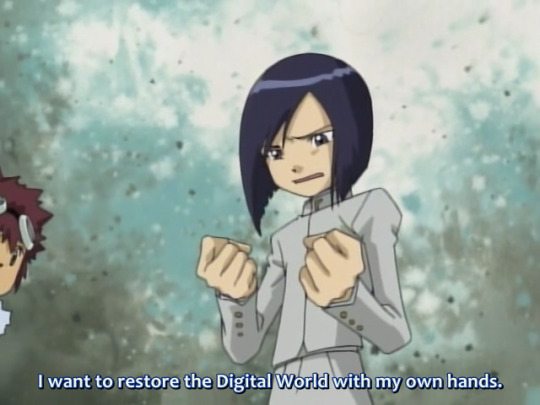

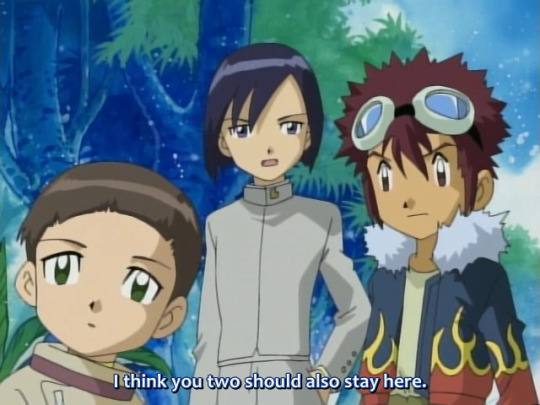
The initial problem, however, is that Ken is too assertive about the wrong things at first. Like, say, in 02 episode 26, when he assertively says that he’s going to...recklessly chuck himself into an exploding reactor! For the third quarter of the series, Ken deliberately tries to keep his distance from others, and is very clear and open about his reasons why: in his mind, it’s his responsibility, and the others shouldn’t have to be involved. He doesn’t want their friendship, he doesn’t even think he deserves their friendship, and here’s Daisuke going “okay, yeah, but that’s stupid, shut up and let us help you.”
Adventure and 02 have a strong thread of driving it home that “doing things on sheer principle eventually becomes pointless when it gets in the way of being practical” -- and Daisuke, being a simple-minded and “straightforward” person who doesn’t overthink things, is basically there to keep Ken’s focus back on the proper picture. Because yeah, Ken can attempt to do things like frame things in terms of whether he “deserves” all of this, or “whose responsibility” this all is -- but the fact of the matter is that Daisuke and his friends want to do something and help instead of being sitting ducks about it, Ken’s practically not going to be able to do this alone, and, well, that’s the base of their first Jogress in 02 episode 26! Ken says outright that his goal is to do something to help, but then decides that “helping” should involve suicidally chucking himself into an exploding reactor, and Daisuke, hearing out Ken’s troubles, reminds him that him dying there won’t actually help the way Ken wants to help, because it won’t leave him alive to do all of the other things he wants to do and will hurt his family even more just when he was starting to repair things with them -- and as much as this extremely suicidal plan might temporarily spare the others from dying in an explosion, Daisuke would have to live with the guilt of letting Ken go off to die like that, so it won’t make him happy either.
So in other words, while Ken’s trying to sort out his complicated feelings of guilt, shame, and sense of responsibility, Daisuke’s there to keep his head on straight and remind him when he’s about to run himself in mental circles. Ken would have easily spent the rest of the series trying to make up for what he did even without Daisuke’s help, because he’s such a strong believer in “the right thing to do”, but his way of going on about it would have involved him staying in isolation out of a perceived sense of responsibility, endangering himself out of a sense of self-sacrifice, drowning himself in self-blame and feelings of regret, and, eventually, not addressing the very gaping hole in his life that he very much needs emotional support from others right now.
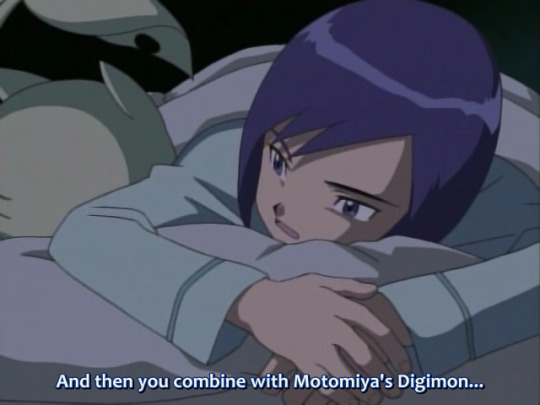
One thing particularly interesting about the Japanese version of 02 is that, for nearly the entirety of the second half of the series, Ken only refers to Daisuke as “Motomiya”, which is surprising given the fact that he employs given-name basis with the others quite quickly. Ken eventually does commit to “Daisuke” after the series in almost all post-02 material, and this image fits the two so well that pretty much every doujinshi artist has caught onto it despite it not being there all that much in the actual series, but it really took him a while; what gives? (Daisuke himself committed to “Ken” from surname basis “Ichijouji” starting in 02 episode 39.) Well, the important distinction is that Ken dropped the honorific with him from very early on -- meaning that he did want to approach Daisuke with a little bit of casual bluntness in a way beyond the distant respect he treated the others with, but at the time, going straight to buddy-buddy on given name with no honorific at all would have been a bit too much for him, and it comes off as him almost deliberately giving off a sense of distance. Why?




Ken didn’t have too much of an opinion on each individual kid in the group until 02 episode 8, when he developed a particular hatred for Daisuke for “ruining his pride” and decided to emotionally torture him a bit. Then, come 02 episode 25, this same kid approached him with no sense of grudge whatsoever, and presents him with a completely different way of seeing things: “whatever you did in the past, you’re clearly trying to help now, which means we’re now on the same side, so we should work together.” It’s pragmatic; it’s extremely pragmatic, and it’s not like Daisuke was working off of blind optimism and trust as much as he observed, very practically, that Ken was clearly trying to do better now and that therefore they should work together and make use of it. This kind of thought pattern is completely alien to Ken’s “I deserve/don’t deserve this” mentality at this point of this series, and by all standards of his own logic Daisuke should be one of the people who hates him the most, and yet -- nope!
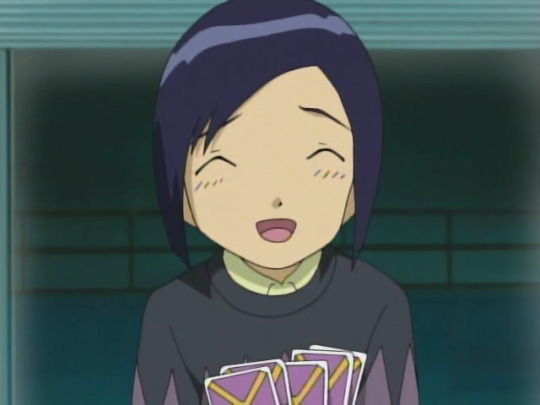


By the time of their Jogress, Ken of course understands that Daisuke’s trying very hard to communicate with him, and thus they develop a sort of rapport -- but they’re not quite friends yet at the level of truly being “comfortable” with each other, because most of the second half of the series involved circumstances where Daisuke was helping Ken through a very emotionally hard time. It’s only at the point of the Christmas party in 02 episode 38 when Ken can really think about having these kids as real friends in terms of socializing and not just people who are willing to work with him in his penance journey. It’s enough that Ken’s able to admit that he wants the help of Daisuke in 02 episode 44, when beforehand he’d been trying to keep everyone out of what he’d perceived as his business. And, as Ken’s slowly more exposed to Daisuke’s way of life and its influence on the rest of the group around him, he comes to understand that maybe having a “close friend who can support him” isn’t that bad after all, since it’s not like these friends are just being “open-minded” towards him; they really are there to support him and his actual feelings and welfare, not just “cutting him slack” because he’s helping.
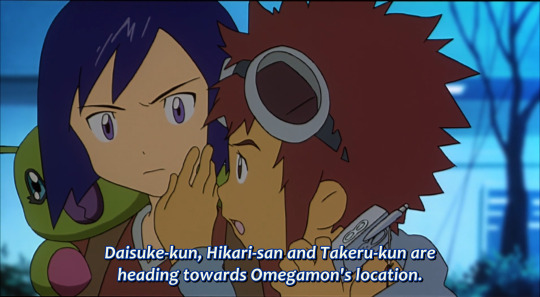
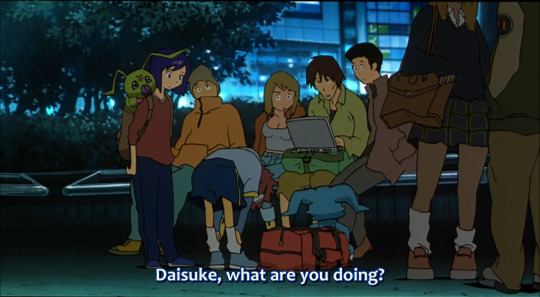
And so, with that, once the crisis is resolved and all is said and done, Ken finally truly accepts Daisuke as his friend and moves him up to given-name basis (no honorific!). This is most prominently shown in Diablomon Strikes Back, where their interactions are now removed from the question of Ken’s former actions and his emotional problems, and it turns out, they’re still good friends in the sense that friends are. As in, people who laugh together, hang out together, converse with each other casually; even if they are working together on the same thing for the duration of the movie, it’s not such an emotionally tense situation that you could chalk their interactions up to sheer necessity. With Daisuke’s help, Ken was able to move on from all of his past hangups, and the two of them became able to enjoy the moment of “now” like normal children.
What Ken does for Daisuke
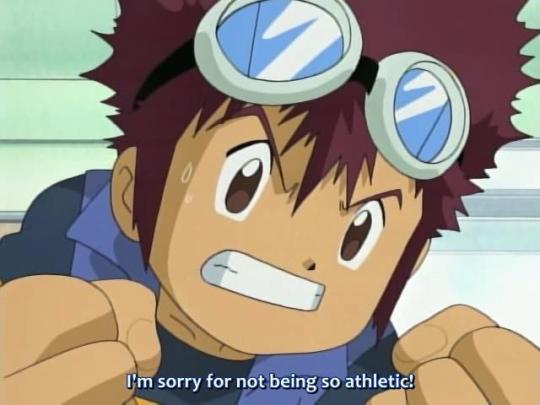
Daisuke may be simple-minded enough to not have deep-seated concerns that eat at him every day, but that doesn’t change the fact that he was a bit socially maladjusted during the early parts of the series. Namely, being really insecure and prone to getting defensive whenever he felt he was being made fun of. Those kinds of things were what was most likely to get Daisuke to “lash out” at others, because he slips into his worst bouts of these whenever he’s lacking in validation.


Daisuke was, undoubtedly, improving over the course of the series, with him slowly starting to become more assertive by the time of 02 episode 20. It’s incorrect to say that Ken was the only person who could truly help him with this; 02 is a series about a group dynamic after all (even if the Jogress pairs are the most instrumental in helping each other), and it would be a pretty unhealthy relationship if one person were so dependent on another to even remotely function. But starting in 02 episode 22, when the crisis is momentarily resolved and everyone’s not sure what to do, Daisuke’s feeling of being third wheeled by Takeru and Hikari shoots up right at the moment everyone’s feeling a bit lacking in purpose. Two episodes later, Miyako immediately stages an intervention to help keep his mind off of things, and she’s arguably even the most comfortable with him at this point in time.
It’s not that Daisuke isn’t improving, nor that his friends aren’t trying to help, but, well...emotionally sensitive as Miyako can be, she’s also a bit all over the place herself and sometimes needs restraining; Hikari may be assertive, but she’s pretty obviously apprehensive about shutting Daisuke down too bluntly, and Takeru being so hard to read and evasive about everything means that Daisuke can’t really tell what he’s thinking or understand his intentions; Iori is younger and is restraining himself, so he still won’t cross certain lines with Daisuke. So as you can see, they’re all doing their best, and they’re not doing a terrible job of it either; hell, the rest of the series involves them maturing into people who can better interact with and support each other, so their own relationships with Daisuke are likely to improve even well after the series ends. It’s just that, especially at this point in the series, there’s definitely room for an extra person to fill a certain niche that’s got a gaping void here, begging for someone who’s assertive and put-together enough to regularly keep Daisuke in check, yet also willing to be properly straightforward with him to the extent that he doesn’t have to feel insecure about their intentions. Hmm, who could that be?
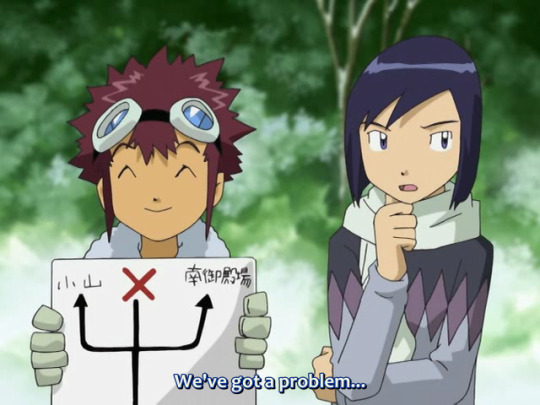
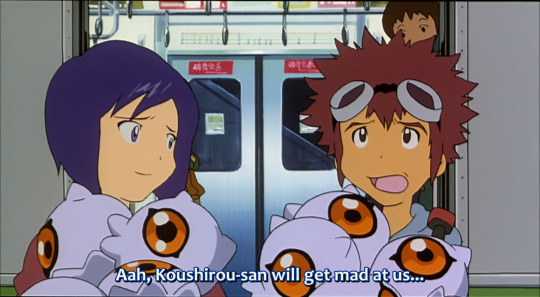

Although “the priority of reaching out to Ken” eventually becomes enough of a distraction that it certainly takes Daisuke’s mind off potentially feeling insecure, as we start to see more “casual” interactions between Daisuke and Ken, we see that Ken actually fills in a lot of the gaps that had been so sorely missing in this group dynamic for a while. Forward-thinking as he is, Daisuke’s simple-minded way of going at things has its drawbacks in that he’s not very smart or good at thinking, but Ken is the opposite, being intellectually analytical and much more thoughtful overall, and since Daisuke is the kind of person who defers to others when they’re better than him at something, Ken being right next to him means that he can give him a hand in making important decisions he can’t by himself. This is especially so in Diablomon Strikes Back, when Ken’s role is largely keeping an eye on Daisuke and making sure he’s not a loose cannon -- something he’s very capable of doing -- but also simply being there as a springboard whom Daisuke can comfortably approach and talk to, since Ken is such a mild-mannered, straightforward person who won’t set off his overly defensive tendencies as easily.
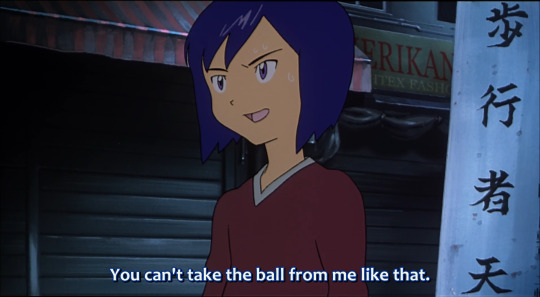
That doesn’t mean that Ken is completely above teasing him, of course -- a lot of post-02 material in fact makes sure you understand that he’s not just some soft-hearted saint and can be quite the snarker when he wants, since his increased comfort level with Daisuke means he’s now able to poke at him here and there, even doing something as mean as dumping all of the Christmas shopping on him (the character songs and other related in-character material lie in questionably canonical territory, but that kind of punchline is not unreasonable to imagine given their respective personalities). But, overall, he sets the right tone for Daisuke to have a friend he’s able to be around regularly and receive support from, and to fill in that niche of his casual interactions so that Daisuke can have some more solid grounding in his life.

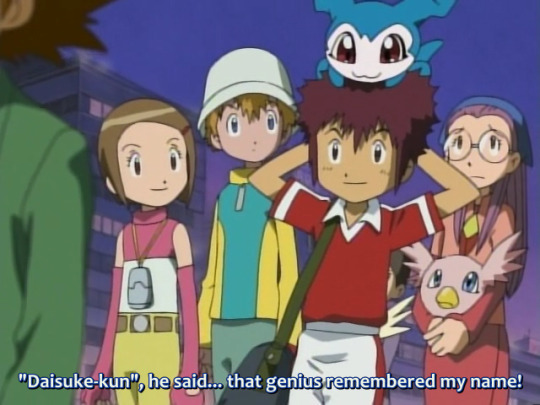

It’s also a testament to how much Ken himself had changed in terms of becoming the kind of person who could handle Daisuke like this. When the two of them first “met” in 02 episode 8, while Ken was still fully under the influence of the Dark Seed, even if we were to put the part about him being the Kaiser aside, this sort of person would never be able to become a good friend to Daisuke. This episode had Daisuke put him on a pedestal -- someone he’ll never be able to be as good as, whom he looks up to as an “idol”, much like the way Daisuke has a tendency to instinctively put himself down in uplifting others. Thus, it was a negative relationship for both of them; Ken being put on a pedestal that ultimately made him uncomfortable, and Daisuke contributing to putting him there in the first place, and taking it extra personally when that pedestal was shattered. But then, Daisuke himself (and, ultimately, the rest of the group) became able to treat Ken like the “normal person” he wanted to be, with no pedestals, simply considering him as a friend with his own feelings and needs; as a result, being this sort of “normal person” making friends through his true personality and desire to support others meant paved the way for him becoming the one person who was best equipped to deal with the very difficult-to-handle Daisuke.
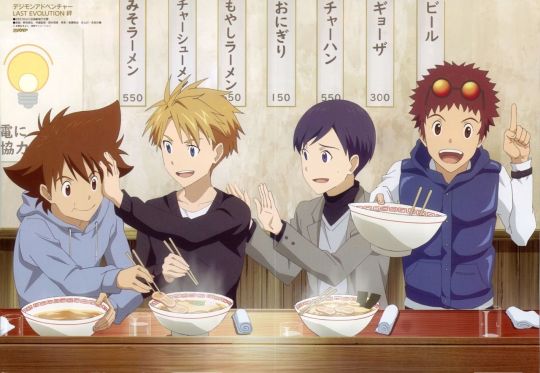
Incidentally, in terms of Kizuna: considering how 02 was such a series about everyone becoming people who could fundamentally interact and communicate better with others, it stands to reason that everyone’s relationships with each other would uniformly improve even after the events of 02, and you can see better interactions between everyone that go beyond just the Jogress pairs. Ken’s clearly able to interact with more of the people in the group in a much more casual manner than he did in 02 itself, and it’s made an important point in the drama CD that Daisuke took everyone’s incidental advice to heart, not just Ken’s. However, advertising material still prominently features the two as a pair, and although part of this is of course due to marketing, Ken is also the one who gets the final words in extracting his “promise” from Daisuke in the drama CD; the official website also calls special attention to him being the one to accompany Daisuke on his ramen outings, even though the one depicted in the drama CD and movie was planned to involve everyone in the group. There are multiple indications that Daisuke himself has learned to become somewhat less defensive and prone to insecurity compared to himself in 02, and it seems that this was accomplished via Ken still actively putting himself in a role of checking on him and making sure he feels properly supported in all of this.
#digimon#digimon adventure 02#motomiya daisuke#ichijouji ken#daisuke motomiya#ken ichijouji#shihameta
154 notes
·
View notes
Text
No Reason for Love
Krel wakes up to find Douxie sleeping on top of him.
So, what was that saying? Write while exhausted as the pills to make you tired kick in, edit the next morning? That was me with this fic because I wanted to get it done before RotT. This only has vague spoilers for the trailer.
CW: Body dysmorphia, self esteem issues, offscreen death, one gore reference, and one reference to sex (in terms of differences of Akiridion vs human reproduction; the gore reference is more graphic than the sex reference, and all characters depicted are adults)
AO3
FFN
Krel woke up to the feeling of pressure running along his body. He opened his eyes.
Oh. Right. Douxie and Krel had been watching a movie on Krel’s phone, and they had fallen asleep together. Or, more specifically, Douxie had fallen asleep on top of Krel, with his head directly on top of Krel’s core.
No.
On top of Krel’s cores.
That’s why they were here, after all. Krel was in (self-imposed, because his friends and family trusted him too much) exile in a quadrant of deep space, where he shouldn’t be able to hurt anyone. That had been the plan after Krel had stabbed himself with Gaylen’s core. Oh, he was strong enough to defeat the Arcane Order, but he was dangerous. He was too dangerous to be around people.
His boyfriend had decided that he was the exception to this rule, and Krel had been too selfish to say no, that they’d have to date at an even further distance than they had been for the six weeks they’d been dating.
And yes, Krel knew that Douxie had come with him for more reasons than Krel’s benefit, but Douxie could surely grieve Nari and Archie in a safer way than running off to live alone with the dangerous newly-made abomination of a god. Yes, Krel was an abomination, even if his friends, sister, and boyfriend all hated it when Krel used that word to describe himself. But what word was he supposed to use? He had two cores.
And with one of those cores, Krel could feel every minute exhale that came from Douxie’s sleeping form.
That was right. He was wearing one of Douxie’s shirts. His normal clothes didn’t quite fit him anymore given his wings and his second core, and so he’d taken to wearing human clothes that had been tailored to fit him and his arms and his wings.
Douxie had enchanted his own clothes to fit Krel, with holes opening up for Krel whenever he wore them. Douxie had offered to enchant Krel’s normal clothes, but as much as Krel liked how Akiridion magic and technology were compatible he…
Krel couldn’t remember what excuse he’d used, but he’d really wanted to just keep wearing Douxie’s shirt even though it exposed both of his cores with how low the neckline was. It shouldn’t have mattered, not with how Krel was rather indestructible now, but every time he caught sight of his double-cored reflection he was reminded of just how much he hated himself.
Douxie shifted in his sleep, inadvertently nuzzling his face against Krel’s cores.
Krel tried very hard not to cry. Douxie needed to sleep. He deserved to sleep. He was sleeping peacefully. Krel couldn’t wake him.
But Krel felt so loved and he didn’t deserve to be. This couldn’t last. One day, Douxie would realize that the man he’d fallen in love with had been sacrificed and an abomination was all that was left. He tried to keep still as tears began to slip out of his eyes, but he began to shake nonetheless.
Douxie lifted his head away from Krel’s cores. Krel found himself missing the point of contact, and feeling horrible for missing it, and began to cry harder. Douxie shifted his body, propping himself up with one arm and using the other hand to brush away some of the tears on Krel’s face.
“Hey, what’s wrong?” His voice was so soft and gentle despite how exhausted he looked.
“I love you,” Krel said. Douxie’s eyes widenend.
Oh.
Right.
Krel hadn’t told Douxie that he loved him, not when Krel was still himself instead of an abomination. Douxie probably wouldn’t want Krel’s love now. And even if Douxie loved Krel before the seals had been broken, surely he wouldn’t now.
Krel looked away. “I understand if you don’t –“
Douxie turned Krel’s face back to him. “I love you too.”
Krel didn’t think he could have cried any harder. He proved himself wrong.
Douxie inhaled sharply but his voice was still so soft. “What did I do wrong? How can I fix this?”
Krel didn’t know how the situation could be fixed without killing his relatives. It would be proper to have one heir to House Ventis and one heir to House Akraohm sacrifice themselves to power the cannon, but Aja might want to sacrifice herself so she wouldn’t have to live with the guilt of killing her brother.
“You didn’t do anything wrong.”
“But I still made you cry. Harder, anyways.”
“It’s… it doesn’t matter.”
Douxie frowned. “It does. You being happy matters to me. So, please tell me why you’re crying, and what I can do to make you feel better.”
Krel swallowed down tears. “Your head was on my core. Cores. Touching them is very intimate –“
Douxie’s face grew grave and flushed. “Krel, I’m so sorry, I didn’t know that, er, I didn’t know where those parts of your body were and –“
Krel rolled his eyes. At least the shock made his tears slow their deluge. “Get your mind out of the gutter. Let’s just say that Akiridion and human reproduction are more similar than you’re thinking, at least in location.”
Douxie nodded. “Okay, so I didn’t cross that line, but I clearly crossed a line. Which one?”
“I don’t know if there’s a good comparison? It’d be like you holding my literal heart, I guess?” Douxie grimaced at the mental image. “But not exactly. It’s just, since you’re not immediate family or trying to save my life, you’d only be doing that if we were at a level of intimacy of being at the last stages of our engagement.”
Or maybe other Akiridions had that level of intimacy at sooner stages. Maybe it was an old-fashioned, stuffy royal way his parents had raised him and Aja. He knew at least one of his grandmothers believed that core-touching should have been reserved for marriage, but it was possible that she was simplifying it down for Aja and Krel.
“And I know our friends have made elopement jokes before, but…” Krel looked away, trying to will himself not to start crying harder again.
Even if Douxie loved Krel, surely Douxie wasn’t interested in marrying him.
“Would you want to?” Douxie asked. “This isn’t a proposal, but would you even be interested in marrying me?”
Gently, Krel pushed Douxie away so that Krel could sit up, half-facing his boyfriend. There was an urge to wrap his wings around Douxie, but no. That shouldn’t happen.
“Only if I was sure you understand the consequences.”
“Consequences? Like what? Having to get a second pair of arms grafted onto me?”
Krel tucked his wings closer to himself. Douxie sighed.
“I’m sorry, I’m tired and wasn’t thinking. But, what do you mean by consequences?”
“Why do you love me? And no, ‘you’re you’ isn’t an answer, because I’m not. Not anymore.”
“You are still you even with the wings and everything, but I’m too tired to have this argument again. If you won’t let me use that reason, then how about I just do?”
Unconditional love felt wrong. “That’s circular reasoning.”
“Well, do I need a reason to love you?”
Yes, because if Douxie knew his reason for loving Krel then he would be able to pinpoint when that reason wasn’t itself anymore.
No, because if Douxie knew the reason why he loved Krel, then Douxie would leave and Krel was too selfish to want to be exiled alone.
Krel started sobbing again.
Douxie drew Krel into his arms, gently stroking Krel’s back between his wings.
The next time Krel woke up, his head was directly on top of Douxie’s heart.
#krexie#krel tarron#hisirdoux casperan#tales of arcadia#3below#toawizards#rise of the titans#gaylen!krel#my writing
102 notes
·
View notes
Text
Doom At Your Service: Analysis & Theories for EPs 7-8
Welcome back to another edition of analyses and theories time with me! I’m going to try and keep this post as short and as simple as possible. In case I don’t, I apologize in advance! Also, sorry if this post is filled with grammar mistakes and confusing syntax...I'm writing/editing this late at night and my ADHD meds have lost their effectiveness.
Anyways Eps 7-8 was pretty awesome and I’m glad that a bunch of my previous theories had come true! For those who wonder how I come up with some of these theories, I just look at everything whether it be big or small. I also try to look for connections and patterns. At the same time, I try to understand the motivations of characters and what is the big picture the writer is trying to paint. Once you're able to do all of that then you can predict where the story is going. This is how for the most part I was able to predict the events and endings of shows like TOTNT and TKEM. Anyhow, let’s get down to analyzing and theorizing! Turn on those thinking caps!
What the Rock Balancing Structure Represents
Rock balancing is a form of art that involves a person placing a combination of rocks in an arrangement. To achieve balance of the rocks, one must be very patient and compassionate. In its completion, the structure represents that while things may appear impossible, they are actually possible. So what seems impossible, but can actually be possible? Hmmm probably Myul Mang learning what it means to be human and ending up becoming human. Notice that both the rock art is next to the plant and the story of Pinocchio? It's saying saying that the impossible can be possible. It's possible for Myul Mang to be able to learn what it means to be a human so that the impossible can happen...he can "grow" up to becoming a real human.
The whole rock balancing structure could also signify that in order to grow, one must overcome one's deepest fears. I don't know about you all, but stacking rocks is a scary thing especially since at any moment the whole thing could fall over. Anyways, if you remembered, Myul Mang had been searching everywhere for Dong Kyung and feeling like one of his worst fears (Dong Kyung not existing) had came true. It's only when he goes to Dora's hospital room and sees both the Pinocchio book and rock structure that he got Dora's lesson. And that's why afterwards you didn't see Myul Mang going on another search for Dong Kyung somewhere else.
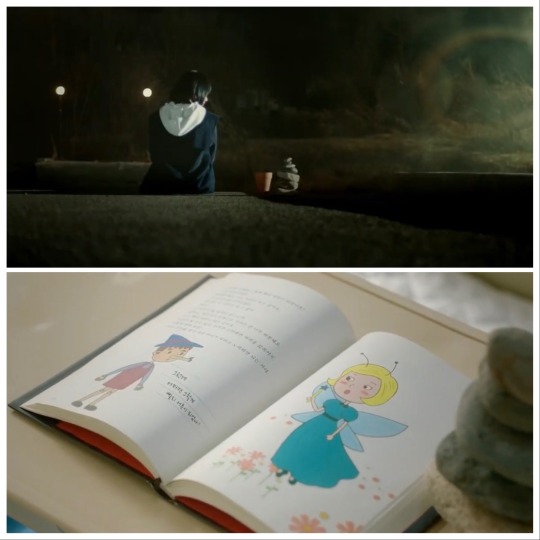
A brief digression. I’ve seen multiple people theorizing that the plant and the butterfly represent Dong Kyung and Myul Mang respectively. To them I say, did you just completely miss the part where Dora says the plant is Myul Mang? Myul Mang is both the butterfly and the plant. For those who still don’t see that, let me break it down.
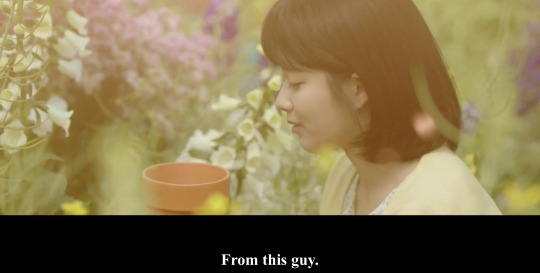
First, what do butterflies symbolize? They symbolize metamorphosis, death, and rebirth. Myul Mang is not a literal butterfly, but he will eventually be one in a metaphorical sense. If anything, Myul Mang right now is like a caterpillar on the verge of entering the cocoon stage that is followed by a reemergence as a butterfly aka human. You can also look at it this way, Pinocchio is a butterfly too. Why? Well, look at what happens to Pinocchio. He is reborn as a real boy after having gone through metamorphosis (puppet -> real boy).
Now let’s examine the plant symbolism. What do plants represent in DAYS? They represent humans. What is Dora growing? A human Myul Mang..DUH!! Sorry, but I didn’t think it was that hard of a concept to grasp especially since Dora has already explicitly said what she is growing in that one scene. For Myul Mang to grow up to become a "good" human, he needs to learn to think about others, forgive himself, be compassionate (not only towards himself, but others as well), love others, etc. Other things Myul Mang would probably need to learn is how to love his fate or amor fati (loving your fate means loving it all, not just the good parts, but the bad parts too; loving it so much so that you would never want to change anything about it and would gladly relive your life the way it was over and over again for all of eternity).
I don’t think the "plant" will fully "blossom" until Myul Mang sacrifices himself to save Dong Kyung for the sole reason that he loves her (in contrast to sacrificing himself for his own personal gain). Therefore, that's probably the final lesson -- how to be completely selfless.
Dora just wants her son to grow up to be a "good" plant (human) so she doesn't have to end up pulling him out aka end him before he even becomes human! Okay???
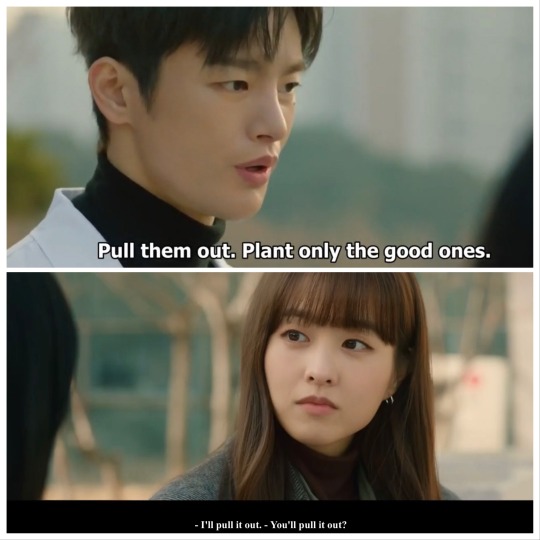
Sorry if what I've just said was confusing. What I meant to say is that Myul Mang's personal growth is reflective in the plant's growth. The more he learns of what it means to be a "good" human, the more the plant will grow until it blossoms into a beautiful flower (a real human).
If we want to connect the idea of personal growth to the story of Pinocchio, we see that Pinocchio's growth occurs only after he experiences pain (physical and emotional) and love. From these experiences, he learns what it means to be a "good" boy and is rewarded by the Fairy transforming him into a real boy.
One Wish or Wishes?
In my previous post, I had briefly touched upon how I think Dong Kyung is going to wish for brain cancer to be cured. Though I still think this, I nevertheless want to explore some of the other possibilities of what her wish could be.
Potential Wishes:
1) Myul Mang to Become Human
2) More Wishes
3) Contract to be Voided
4) No One Remembering Her After She Dies
For #1, Dong Kyung wishes Myul Mang to become human, but then she still dies from her untreated brain cancer…so nope. For #2 and #3, are these wishes even allowed? I would like to point out some flaws of the writer. Maybe it’s not so much a flaw, but an annoyance I have with the writer of DAYS. What one can or cannot wish for is not explicitly stated. Due to this, it is somewhat difficult for me to accurately predict what Dong Kyung will wish for. It’s like trying to detect a substance without being given its upper and lower limits or range of detection (sorry for the science related analogy) ! For #4, I guess this one could be probable, but there is just too much evidence pointing to Myul Mang's death. After exploring each of the possibilities, I'm still left thinking that Dong Kyung's one wish will be to cure her cancer.
Anyways, even if Dong Kyung wishes for her brain cancer to be cured, it’s not really a happy ending since Myul Mang still dies. Is there any other way for Dong Kyung to make another wish so that she can save Myul Mang? I think there is and it comes in the form of the “gift” that Dora gave Dong Kyung. In my previous post, I had theorized that the marble may have a larger purpose than just being a symbol of how the fate of the world is Dong Kyung hands. I believe now that the marble’s larger purpose is that it is a type of wish fulfilling stone. Why? Because we know fantasy dramas typically make references to mythology. In this case, the writer of DAYS is probably referencing Hindu mythology.
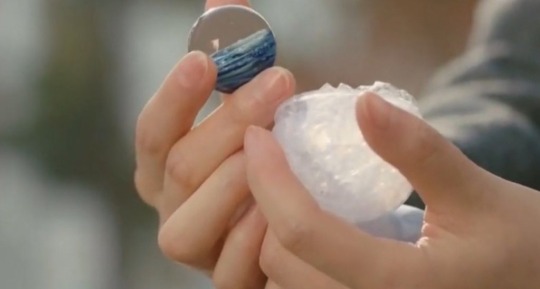
In Hindu mythology there are 3 main gods:
1) Brahma: The Creator
2) Vishnu: The Preserver
3) Shiva: The Destroyer (Sounds like Myul Mang right? Also, the love story between Shiva and Parvati is somewhat similar to that of Myul Mang and Dong Kyung’s love story.)
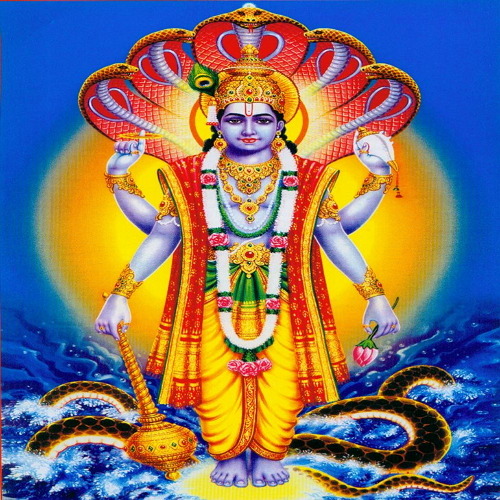
Dora is the equivalent to the god Vishnu in Hindu mythology. Vishnu is often depicted wearing a “Cintamani”, a type of wish fulling stone analogous to the Philosopher’s Stone (hint hint…transforms something from one form into another…immortal -> human) in Western mythology. Given this, the marble/Cintamani in Dong Kyung's possession could be the key to Myul Mang’s rebirth.
Some might ask, “Well why can’t Dora just use it to wish for her son to be reborn as a human?”. Well, remember that both Dora and Myul Mang are slaves to the wishes of humans. They themselves cannot fulfil their own wishes or desires. Meaning, even though Dora and Myul Mang can wish for something to happen, they cannot carry it out unless humans wish it too. Also, as I mentioned previously, deities in kdramas never just give humans gift because they’re being nice. Rather, they give gifts to humans so that humans can help them accomplish their overall goals/wishes.
So putting it all together, do you see where I’m going with this? Dora has the same wish as Dong Kyung which is for Myul Mang to live, but Dora is unable to execute her goals/wishes unless Dong Kyung wishes it too. Dora knows that Dong Kyung will probably use her one wish to cure her brain cancer. At the same time, this leaves her son, Myul Mang, to die. Therefore, Dora gives Dong Kyung the wish fulfilling marble with the intention that Dong Kyung will use it to wish for her son, Myul Mang, to be reborn as a human. With Dora/Dong Kyung’s wish, Myul Mang will be free from his cursed life as an immortal and be reborn to be able to live happily with Dong Kyung.
Side note, the rebirth of Myul Mang into a human can either be dependent on Myul Mang's personal growth or it can be dependent on this wish fulfilling stone or both! I'm leaning more towards his personal growth as being the catalyst for his rebirth, but who knows! It very well could be that the marble has a role to play in his rebirth.
Is Dong Kyung Going To Be An Immortal?
No…no…and NO!!
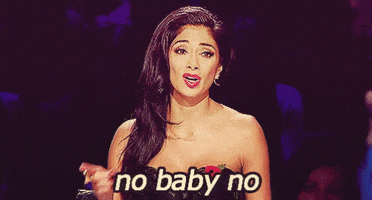
Some might ask why don’t I think this? Well, for a bunch of reasons. I’ll admit I used to think that it would be very romantic for a human to become immortal so that they can be with their immortal lover forever. However, the more I thought about it, I came to the realization the notion of forever is not romantic nor beautiful. At its core, the concept of eternity is quite terrifying and ugly. And if you haven’t realized already, the writer of DAYS has been making multiple arguments against immortality. For anything to have meaning, it must have an end. In this sense, the end is beautiful.
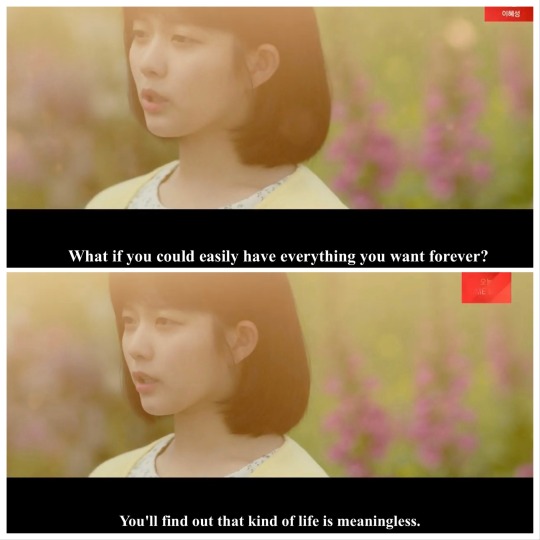
To get my point across, I want you to try and think about some things. What keeps life meaningful? Experiences? People? Well, imagine doing something you love for a year. Now imagine doing it for trillions or zillions of years. Experiences no matter how good they are at first will eventually become tedious if you do it for long enough. For example, eating your favorite dish may be good for a while, but not for zillions of years. At one point or another, you ultimately lose your desire to want to eat it or eat entirely for that matter.
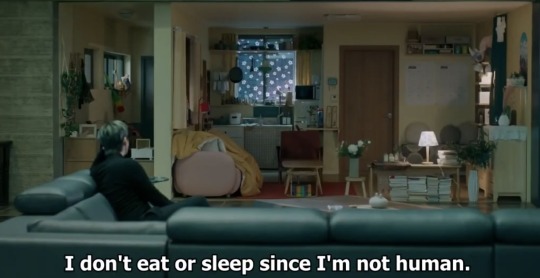
Now surely getting to know people and loving them can keep your life meaningful right? Well, how many times do you think you could handle knowing and loving people who eventually disappear? Eventually, you grow tired of crying and mourning over dead loved ones that you become numb. Now imagine being Dong Kyung. She would have to witness her family, their family, and so forth dying over and over again for all of eternity. Doesn’t that seem tortuous? Sure, one could argue that at least she has Myul Mang with her, but do you really think her love for him could sustain her forever? The relationship between Myul Mang and his mother, Dora, is a prime example of how a loving relationship could turn sour over a great deal of time. The gift of immorality Dora bestowed on Myul Mang became a curse instead of a blessing. So why would Myul Mang want to give Dong Kyung something that was basically a curse for him? As for Dora, she probably wouldn’t want to give Dong Kyung the same gift after seeing what it did to her son.
If you continue to think that Dong Kyung will become an immortal being, did you really smell what the writer of DAYS was cooking or did you just smell what you were cooking?
The Bad Case of the Riddles
From what I have been reading on multiple platforms now, it would seem that a lot of people are rather confused about a lot of things. It’s understandable! Throughout the show, the writer has presented some complex philosophical concepts that may be difficult for some viewers to grasp. To further add to the confusion, the characters at times do speak in what appears to be riddles. This I believe may be one of the major flaws of the writer. She has to consider that her audience are probably people who have never read any philosophical works before. Most viewers aren’t here to decipher cryptic messages or see how they’re connected to some major philosophical concepts such as eternal recurrence, existentialism, nihilism, amor fati, etc. Most are here to shut off their tired brain and enjoy some good fantasy romance! I know I’m totally one of those people!
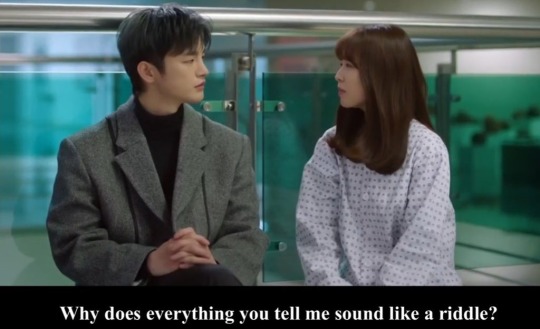
Needless to say, I did find myself in a debate of whether I should discuss some philosophical concepts referenced in the show as to help you all gain a better sense of understanding. However, I concluded that it would take too much of my time to do so. Additionally, despite my best efforts to use the simplest of words, I found that whatever I had already written may have still been confusing to the everyday reader. Anyways, if there are any particular scenes or dialogue you all want to me go over, please feel free to use the ask button and I’ll do my best to try and answer them!
Whats Going to Happen Next?
Probably more filler type stuff aka more bs. It's common in kdramas for characters to go back and forth on their initial decision of whatever. Dong Kyung is going to break up with Myul Mang because she loves him and doesn't want him to die. And before the breakup, she's going to give him some good memories to remember her by. Following this, she's going to try and love herself so that she's the one that ends up dying and her wish is going to be for everyone to forget her? Okay......Zzzzzzz!! Idk... Dora is probably going to intervene somehow to get Dong Kyung and Myul Mang back together again.
Other Random Thoughts
What I think would be interesting to learn about is the connection between Dong Kyung's parents death and Dora past self's death. It wasn't just all a coincidence that they both died on the same day. Who knows... maybe Dong Kyung was meant to be in the car that day with her parents, but Dora's past self sacrificed herself to change Dong Kyung's fate.
Also, I still don't think Dong Kyung is going to die, I mean you got her brother praying to the deities that she lives!
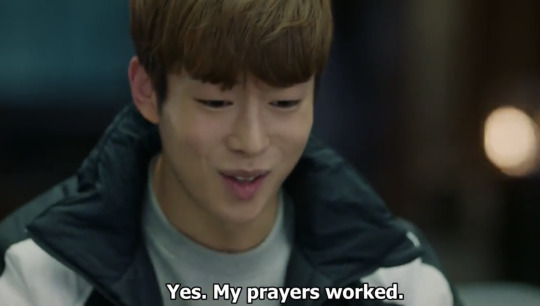
Okay, I'm done. I wrote this in Microsoft Word and it was 5 pages long. My brain is dead. There's probably something I should've gone over or elaborated more about, but oh well. Thanks for reading this disjointed post!
#doom at your service#doomatyourservice#myulmang#myul mang#tak dong kyung#takdongkyung#park bo young#parkboyoung#seo in guk#seoinguk#pinocchio#DAYS#theories#my brain is melting
89 notes
·
View notes
Text
Jet and Yue’s Deaths: Were They Necessary?
Two of the most common ideas I see for aus in this fandom are the Jet lives au, and the Yue lives au. I’ve written both of these myself, and I’ve seen many others write them. And while yes, fanfiction can be a great way to explore ideas that didn’t necessarily have to be explored in canon (I’m mad at bryke for a lot of things, but not including a Toph and Bumi I friendship is not one of them, even though I wrote a fic about it), it seems to me that people are mad that Yue and Jet are dead, to varying degrees. There’s a lot to talk about regarding their deaths from a sociopolitical perspective (the fact that two of the darker-skinned characters in the show are the ones that died, and all the light-skinned characters lived, is ah... an interesting choice), but I don’t want to look at it that way, at least for right now. I want to look at it as a writer, and discuss whether these deaths were a) necessary for the plot and themes of ATLA in any way whatsoever and b) whether it was necessary for them to unfold in the way that they did, or if they would have been more impactful had they occurred in a different way.
(meta under the cut, this got really, really, really long)
Death in Children’s Media
When I first started thinking about this meta, I had this idea to compare Jet and Yue’s deaths to deaths in an animated children’s show that I found satisfying. And in theory, that was a great idea. Problem is: there aren’t very many permanent deaths in children’s animation, and the ones that do exist aren’t especially well-written. This may be an odd thing to say in what is ostensibly a piece of atla crit, but Yue’s death is probably the best written death in a piece of children’s animation that I can think of. That’s not a compliment. Rather, it’s a condemnation of the way other pieces of children’s animation featuring permanent character death have handled their storylines.
I’ve talked about this before, but my favorite show growing up was Young Justice, and my favorite character on that show was far and away Mr. Wally West. So when he died at the end of season 2, it broke me emotionally. Shortly thereafter, Cartoon Network canceled the show, and I started getting on fan forums to mourn. Everybody on these fan forums was convinced that had Cartoon Network not canceled the show, Wally would have been brought back. And that is a narrative that I internalized for years. Eventually, the show was brought back via DC’s new streaming service, and I tuned in, waiting for Wally to also be brought back, only to discover that that wasn’t in the cards. Wally was dead. Permanently.
So now that I know that, I can talk about why killing him off was fucking stupid. Wally’s death occurs at the end of season 2, after the main s2 conflict, the Reach, has been defeated, save for these pods that they set up all over the world to destroy Earth. Our heroes split up in teams of two to destroy the pods, and they destroy all of them, except for a secret one in Antartica. It can only be neutralized by speedsters, so Wally, Bart, and Barry team up to destroy it. It’s established in canon that Wally is slower than Bart and Barry, and it’s been played for laughs earlier in the season, but for reasons unexplained, the pod is better able to target Wally because he’s slower than Bart and Barry, and it kills him. After the emotional arc of the season has wrapped up, a literal main character dies. There’s some indication at the end of that season that his death is going to cause Artemis to spiral and become a villain, but when season 3 picks up, she’s doing the right thing, with seemingly no qualms about her position in life as a hero. In the comics, something like this happens to Wally, but then he goes into the Speed Force and becomes faster and stronger even than Barry, in which case, yes, this would have advanced the plot, but that’s probably not in the cards either.
In summary, Wally’s death doesn’t work as a story beat, not because it made me mad, but because it doesn’t advance the plot, nor does it develop character. Only including things that advance plot or develop character is one of the golden rules of writing. Like most golden rules of writing, however, it’s not absolute. There is a lot of fun to be had in jokey little one off adventures (in atla, Sokka’s haiku competition) or in fun worldbuilding threads that add depth to your setting but don’t really come up (in atla, the existence of Whaletail Island, which is described in really juicy ways, even though the characters never go there.) But in general, when it comes to things like character death, events should happen to develop the plot or advance character. Avatar, for all of its flaws, is really well structured, and a lot of its story beats advance plot and develop character at the same time. However, the show also bears the burden of being a show directed at children, and thus needing to be appropriate for children. And as we know, Nickelodeon and bryke butted heads over this: the death scene that we see for Jet is a compromise, one that implicitly confirms his death without explicitly showing it. So bryke tasked themselves with creating a show about imperialism and war that would do those themes justice while also being appropriate for American children and palatable to their parents.
The Themes of Avatar vs. Its Audience
So, Avatar is a show about a lone survivor of genocide stopping an imperialist patriarchal society from decimating the rest of the world. It’s also a show about found family and staying true to yourself and doing your best to improve the world. These don’t necessarily conflict with each other, and it is possible for children to understand and enjoy shows about complex themes. And in a lot of cases, bryke doesn’t hold back in showing what the costs of war against an imperialist nation are: losing loved ones, losing yourself, prison, etc. But when it comes to death, the show is incredibly hesitant. None of the main characters that we’ve spent a lot of time getting to know die (not even Iroh, even though he was old and it would have made sense and his VA died before the show was over--but that’s a topic for another day.) This makes sense. I can totally imagine a seven year-old watching Avatar as it was coming out and feeling really sad or scared if a major character died. I was six years older than that when Wally died, and it’s still sad and terrifying to me to this day. However, in a show about war, it would be unrealistic to have no one die. Bryke’s stated reason for killing off Jet is to show the costs of war. I’ve seen a lot of posts about Jet’s death that reiterate some version of this same point--that the great tragedy of his character is that he spent his life fighting the Fire Nation, only to die at the hands of his own country. Similarly, I’ve seen people argue in favor of Yue’s death by saying that it was a great tragedy, but it showed the sacrifices that must be made in a war effort.
Yue
When we first meet Yue, she is a somewhat reserved, kind individual held back by the rigid social structures of the NWT*. She and Sokka have an immediate attraction to one another, but Yue reveals that she is engaged to Hahn. The Fire Nation invasion happens, Zhao kills Tui, and Yue gives up her life to save her people and the world, and to restore balance. Since we didn’t have a lot of time to get to know Yue, this is framed less as Yue’s sacrifice and more as Sokka’s loss. Sokka is the one who cares for Yue, Sokka is the only one of the gaang who really interacts a lot with Yue on screen, and Sokka is the one we’ve spent a whole season getting to know. While I wouldn’t go so far as to call Yue a prop character (i.e. a character who could be replaced by an object with little change to the narrative), she is certainly underdeveloped. She exists to be unambiguously likable and good, so we can root for her and Sokka, and feel Sokka’s pain when she dies. In my opinion, this is probably also why a lot of fic that features Yue depicts her as a Mary Sue--because as she is depicted in the show, she kind of is. We don’t get to see her hidden depths because she is written to die.
In light of what we’ve established earlier in this meta, this makes sense. Killing off a fully-realized character whom the audience has really gotten to know and care about on their own terms, rather than through the eyes of another character, could be really sad and scary for the kids watching, but not killing anyone off would be an unrealistic depiction of war and imperialism. On the face of it, killing off an underdeveloped, unambiguously likable and good character, whom one of our MCs has a deep but short connection with, is the perfect compromise.
But let’s go back to the golden rule for a second. Does Yue’s death a) advance the plot, and/or b) develop character? The answer to the first is yes: Yue’s death prompts Aang to use the Avatar State to fight off the Fire navy, which has implications for his ability to control the Avatar State that form one of the major arcs of book 2. The answer to the second? A little more ambiguous. You would think that Yue’s death would have some lasting impact on Sokka that is explored as part of his character arc in book 2, that he may be more afraid to trust, more scared of losing the people he loves, but outside of a few episodes (really, just one I can think of, “The Swamp”) it doesn’t seem to affect him that much. He even asks about Suki in a way that is clearly romantically motivated in “Avatar Day.” I don’t know about you, but if someone I loved sacrificed herself to become the moon, I don’t think I would be seeking out another romantic entanglement a few weeks after her death. Of course, everybody processes grief differently, and one could argue that Sokka has already lost important people in his life, and thus would be accustomed to moving on from that loss and not letting himself dwell on it. But to that, I’d say that moving on by throwing himself into protecting others has already shown itself to be an unhealthy coping mechanism. Remember, Sokka’s misogyny at the beginning of b1 is in part motivated by the fact that his mother died at the hands of the Fire Nation and his father left shortly thereafter to fight the Fire Nation, and he responds to those things by throwing himself into the role of being the “man” of the village and protecting the people he loves who are still with him. Like with Yue, he doesn’t allow himself to dwell on his mother’s death. This could have been the beginning of a really interesting b2 arc for Sokka, in which he throws himself into being the Avatar’s companion to get away from the grief of losing Yue, but this time, through the events of the show, he’s forced to acknowledge that this is an unhealthy coping mechanism. And maybe this is what bryke was going for with “The Swamp”, but this confines his whole process of grief to one episode, where it could have been a season-long arc that really emphasized the effect Yue’s had on his life.
In the case of Yue, I do lean toward saying that her death was necessary for the story that they wanted to tell (although, I will never turn down a good old-fashioned Yue lives au that really gets into her dynamism as a character, those are awesome.) However, the way they wrote Sokka following Yue’s death reduced her significance. The fact that Yue seemed to have so little impact on Sokka is precisely what makes her death feel unnecessary, even if it isn’t.
Jet
Okay. Here we go.
If you know my blog, you know I love Jet. You know I love Jet lives aus. Perhaps you know that I’m in the process of writing a multichapter Jet fic in which he lives after Lake Laogai. So it’s reasonable to assume that, in a discussion of whether or not Jet’s death was necessary, I’m gonna be mega-biased. And yeah, that’s probably true. But up until recently, I wasn’t really all that mad about Jet dying, at least conceptually. As I said earlier, bryke says that in the case of Jet’s death, they wanted to kill a character off that people knew and would care about, so that they could further show the tragedies of war and imperialism. Okay. That is not, in and of itself, a bad idea.
My issue lies with the execution of said idea. First of all, the framing of Jet’s original episode is so bad. Jet is part of a long line of cartoon villains who resist imperialism and other forms of oppression through violence and are punished for it. This is actually a really common sort of villain for atla/lok, as we see this play out again with Hama, Amon, and the Red Lotus. To paraphrase hbomberguy’s description of this type of villain, basically liberal white creators are saying, “yeah, oppression is bad, but have you tried writing to your Congressman about it?” With Jet, since we have so little information about the village he’s trying to flood, there are a number of different angles that would explain his actions and give them more nuance. My preferred hc is that the citizens of Gaipan are a mix of Earth civilians, Fire citizens, and FN soldiers, and that the Earth citizens refused to feed or house Jet and the other Freedom Fighters because they were orphans and, as we see in the Kyoshi Novels, Earth families stick to their own. Thus, when Jet decides to flood Gaipan, he’s focused on ridding the valley of Fire Nation, but he doesn’t really care about what happens to the Earth citizens of Gaipan because they actively wronged him when he was a kid. That’s just one interpretation, and there have been others: Gaipan was fully Fire Nation, Gaipan was both Earth Kingdom and Fire Nation but Jet decided that the benefits of flooding the valley and getting rid of the Fire Nation outweighed the costs of losing the EK families, etc, etc. There are ways to rewrite that scenario so that Jet is not framed as an unambiguously bloodthirsty monster. In the context of Jet’s death, this initial framing reduces the possible impact that his death could have. Where Yue was unambiguously good, Jet is at the very least morally gray when we see him again in the ferry. And where we are connected to Yue through Sokka, the gaang’s active hatred of Jet hinders our ability to connect with him. This isn’t impossible to overcome--the gaang hates Zuko, and yet to an extent the audience roots for him--but Jet’s lack of screentime and nuanced framing (both of which Zuko gets in all three seasons) makes overcoming his initially flawed framing really difficult.
So how much can it really be said, that by the time we get to Jet’s death, he’s a character that we know and care about? So much about him is still unknown (what happened to the Freedom Fighters? what prompted Jet’s offscreen redemption? who knows, fam, who knows.) Moreover, most of what we see of him in Ba Sing Se is him actively opposing Zuko and Iroh. These are both characters that at the very least the show wants us to care about. At this point, we know almost everything there is to know about them, we’ve been following them and to an extent rooting for them for two seasons, and who have had nuanced and often sympathetic framing a number of times. So much of the argument I’ve seen regarding Jet centers around the fact that he was right to expose Zuko and Iroh as Firebenders, but the reason we have to have that argument in the first place is because it’s not framed in Jet’s favor. In terms of who the audience cares about more, who the audience has more of an emotional attachment towards, Zuko and Iroh win every time. Whether Jet’s actually in the right or not is irrelevant, because emotionally speaking, we’re primed to root for Zuko and Iroh. In terms of who the framing is biased towards, Jet may as well be Zhao. So when he’s taken by the Dai Li and brainwashed, the audience isn’t necessarily going to see this as a bad thing, because it means Zuko and Iroh are safe.
The only real bit of sympathetic framing Jet gets are those initial moments on the ferry, and the moments after he and the gaang meet again. So about five, ten minutes of the show, total. And then, he sacrifices himself for the gaang. And just like Yue, his death has little to no impact on the characters in the episodes following. Katara is shown crying for four frames immediately following his death, and they bring him up once in “The Southern Raiders” to call him a monster, and once in “The Ember Island Players”, a joke episode in which his death is a joke.
So, let’s ask again. Does this a) advance the plot, and/or b) develop character? The answer to both is no. It shows that the Dai Li is super evil and cruel, which we already knew and which basically becomes irrelevant in book 3, and that is really the only plot-significant thing I can think of. As far as character, well, it could have been a really interesting moment in Katara’s development in forgiving someone who hurt her in the past, which could have foreshadowed her forgiving Zuko in b3, but considering she calls Jet a monster in TSR, that doesn’t track. There could have been something with Sokka realizing that his snap judgment of Jet in b1 was wrong, but considering that he brings up Jet to criticize Katara in TSR, that also does not track. And honestly, neither of these possible character arcs require Jet to die. What requires Jet to die is the ~themes~.
Let’s look at this theme again, shall we? The cost of war. We already covered it with Yue, but it’s clearly something that bryke wants to return to and shed new light on. The obvious angle they’re going for is that sometimes, you don’t know who your real enemy is. Jet thought that his enemy was the Fire Nation, but in the end, he was taken down by his own countryman. Wow. So deep. Except, while it’s clear that Jet was always fighting against the Fire Nation, I never got the sense that Jet was fighting for the Earth Kingdom. After all, isn’t the whole bad thing about him in the beginning is that he wants to kill civilians, some of whom we assume to be Earth Kingdom? Why would it matter then that he got killed by an EK leader, when he didn’t seem to ever be too hot on those dudes? But okay, maybe the angle is not that he was killed by someone from the Earth Kingdom, but that he wasn’t killed by someone from the Fire Nation. Okay, but we’ve already seen him be diametrically opposed to the only living Air Nomad and people from the Water Tribes. Jet fighting with and losing to people who aren’t Fire Nation is not a new and exciting development for him. Jet has been enemies with non-FN characters for most of the show’s run at this point. There is no thematic level on which the execution of this holds any water.
The reason I got to thinking about this, really analyzing what Jet’s death means (and doesn’t mean) for the show, was this conversation I was having with @the-hot-zone in discord dms. We were talking about book 2 and ways it could have been better, and Zone said that they thought that Jet would have been a stronger character to parallel with Zuko’s redemption than Iroh and that seeing more of the narrative from Jet’s perspective could have strengthened the show’s themes. And when it came to the question of Jet’s death, they said, “And if we are going with Jet dying, then I want it to hurt. I want it to hurt just as much as if a main character like Sokka had died. I want the viewer to see Jet's struggles, his triumphs, the facets of Jet that make him compelling and important to the show.” And all of that just hit me. Because we don’t get that, do we? Jet’s death barely leaves a mark. Jet himself barely leaves a mark. His death isn’t plot-significant, doesn’t inspire character growth in any of our MCs, and doesn’t even accomplish the thematic relevance that it claims to. So what was the point?
Conclusion
Much as I dislike it, Yue’s death actually added something to atla. It could have added much, much more, in the hands of writers who gave more of a shit about their Brown female characters and were less intent on seeing them suffer and knocking them down a peg, but, in my opinion, it did work for what it was trying to do. Jet? Jet? Nah, fam. Jet never got the chance to really develop into a likable character because he was always put at odds with characters we already liked, and the framing skewed their way, not his. The dude never really had a chance.
*multiple people have spoken about how the NWT as depicted in atla is not reminiscent of real life Inuit and Yupik people and culture. I am not the person to go into detail about this, but I encourage you to check out Native-run blogs for more info!
134 notes
·
View notes
Text
RWBY and Alchemy: The Birds
So remember when I wrote about the seven metals of alchemy? Well... there are also five birds, and like with the metals, RWBY seems to be associating a specific character with a specific bird.
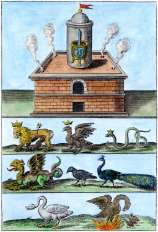
Birds are important in alchemy because they were viewed as symbols of the spirit, as “mediat[ors] between the earthly realm and heaven world.” Adam MacLean states:
The alchemist in observing the flight of birds, recognised in them a picture of the human soul undergoing spiritual development. The soul, aspiring upwards, flying free of the restraints of the earth bound body seeking the heavenly light, only to have to return to the earthly consciousness again.
Black Stage: Raven/Crow (Raven and Qrow Branwen)
The raven/crow/jackdaw is a symbol of nigredo, the blackening. This stage corresponds to earth elementally and symbolize decay and death (obviously).
It’s no coincidence that Qrow and Raven are focused on in the first part of the story, and while they still are under their own arcs, Qrow has been largely separated from his nieces and others during the past few volumes. His nieces and the rest need to grow up rather than depend on Qrow. See Splendor Solis 20:

The children are portrayed as playing with a crow/raven among them, symbolizing their immaturity. However, the adults in the back of the image are in red, showing that they have grown up.
The theme of growing up and maturation is very present in Raven’s arc: namely, she never did. She fled from her adult responsibilities in abandoning her own daughter and ran back to her childhood home, her childhood promise. She also undergoes a putrefaction, a purification by fire in a sense, through her daughter. When Yang confronts her in the vault of the Spring Maiden, she shreds every excuse Raven has, pointing out that Raven is selfish, cowardly, and childish, happy to sacrifice others but never herself. The daughter, here, is the mature one, and thus Yang wins the lamp of knowledge: Yang gave Raven a dose of self-knowledge in the vault, and we see Raven making a small step afterwards via going to see Tai.
Qrow is better off than Raven in that he doesn’t entirely run from his responsibilities... except he does, just in a different way. He drinks to dull the pain, and as a result, Ruby ends up taking care of him on their journey instead of the other way around. Qrow himself acknowledges that he has childish beliefs; his semblance is a self-fulfilling prophecy rather than an actual power.
For the first time in a while I thought, maybe, maybe I could be around somebody -anybody- without my Semblance making it… complicated. And now, it just feels like a childish dream. Gone... like everybody else.
Just like his twin sister, he’s afraid of truly getting close to people, which RWBY seems to hold up as the pillar of maturity and development. I’m not saying Qrow is as negative a character as Raven (he isn’t at all), but he is still struggling to grow up aside his nieces and their companions. In fact, this will be A Thing for all the characters who relate to birds.
The crow is often depicted as dying inside a flask:
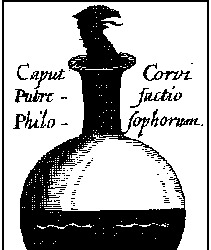
Which could be seen as alluded to by Qrow’s alcoholism. Through not facing the darker parts of himself and not growing up, Qrow is killing himself. Fortunately, he’s been making some steps in the right direction.
Rainbow Stage: Peacock (Cinder Fall)

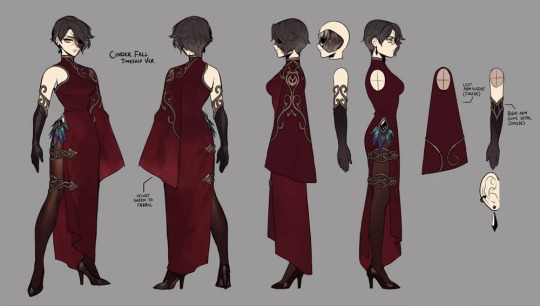
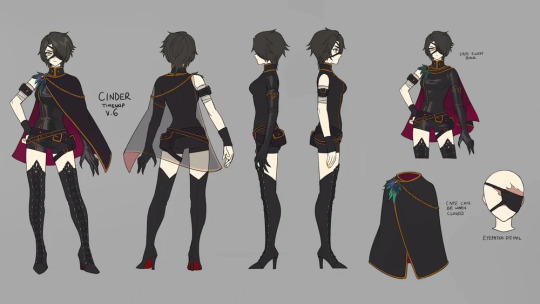
Look the girl has feathers on her outfit that are very reminiscent of peacocks feathers... without the eyes. We’ll get there. The feathers are described by CRWBY as “iridescent” which is a term alchemists employed historically to refer to the rainbow stage.
Post-Blackening, the products of the great work are scattered in a variety of colors, colors that are all at war with each other. To quote Carl Jung,
It is commonly said of the peacock that it has an angel‘s feathers, a devil’s voice, and a thief’s walk.
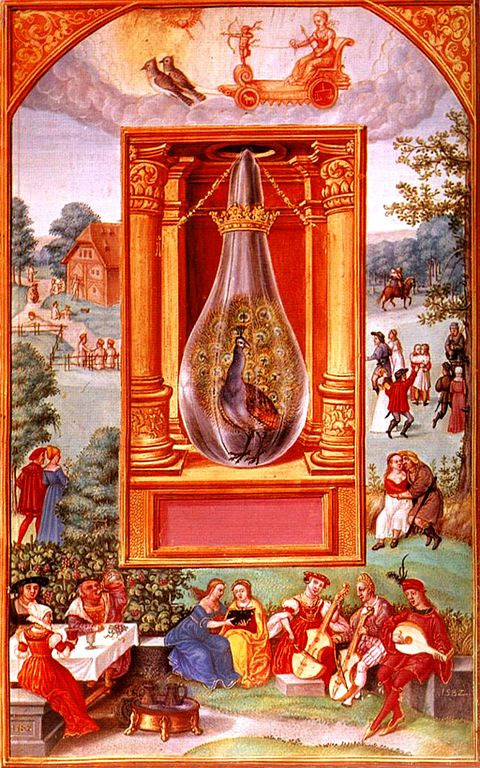
NB: arrows are often used as symbols in part of this stage, and bows and arrows are weapons Cinder is, er, known for using too.
Jung also comments this, which fits with Cinder being both a Maiden, associated with the seasons, and with her being an agent for change in the story as a whole:
Just as the Queen Mother or the mother of the gods grants renewal, so the peacock annually renews his plumage, and therefore has a relation to all the changes in nature.
The peacock is actually a flightless bird: post death in the Blackening, it cannot fly, but in order to proceed through the rest of the stages, it has to gather the disparate colors (ie parts of itself) in order to renew itself (yes, they’re linked to renewal and rebirth).
However, Cinder is not doing this. She received many call-outs, and has severed every bridge people have attempted to build with her. If anything, post volume 8, she seems more lost than ever. So what could be an impetus for her to do this? Well...
Why are her peacock-esque feathers missing their eyes?
The ancient Greek legend of Argus (which is a place in RWBY’s world; the place where Ruby hears Maria’s story of her silver eyes and asks Maria to train her in using her silver eyes) is that there is an immortal monstrous woman with snakes for legs named Echidna who they keep hidden in a cave, but she keeps finding ways to kill humans, until Argus finally kills her. After this, Hera has Argus guard a goddess with his hundred eyes, but then Mercury/Hermes/Thoth kills Argus, and Hera casts his eyes into peacocks’ tails to remember him. I wouldn’t read toooo much into this, but I do think it would be very, very fitting for Cinder to receive a call-out from her “kids”: Emerald and Mercury, the latter of whom is an allusion to Hermes/Mercury and the former of whom might be an allusion to Thoth. Until Cinder has been confronted by Mercury and Emerald, she won’t truly be able to see.
I have said before that I think Ruby will use her silver eyes to save Cinder from being consumed by the worst parts of herself (as literally symbolized in the Grimm taking her over). The decay of the Blackening is washed away to reveal the color of the peacock’s iridescent tail, and so both a confrontation to get Cinder to face the worst of herself, and then pity shown to her by someone who has no reason to be kind to purify her (look, it’s a term in alchemy, and Ruby has been described as “the embodiment of purity”) of the Grimm will probably be the impetus for Cinder to change.
White Stage: Swan/Dove (Robyn Hill, maybe Winter Schnee?)
Robyn’s emblem is a white bird.

The swan symbolises the dissolving of impurity into ash. In Volume 8, when Robyn and Qrow are freed from prison, ash falls everywhere.
Like the peacock, a swan is a bird that does not fly. Robyn is grounded in Mantle, rather than Atlas. After the gathering of opposites in the Peacock’s Tail, the dove/swan “reconciles and unites opposite substances,” according to Lyndy Abraham. Swans swim along the surface of water, while the true colors are concealed beneath; swans dunk their heads underwater, which symbolizes a person diving deep into dissolution and purification. Robyn’s Semblance is also about this: it allows Robyn to sense their true colors and intentions, rather than what they attempt to protect at the surface.
I am also wondering if Winter is somehow connected to this as well, because of the appearance of white birds in her semblance.
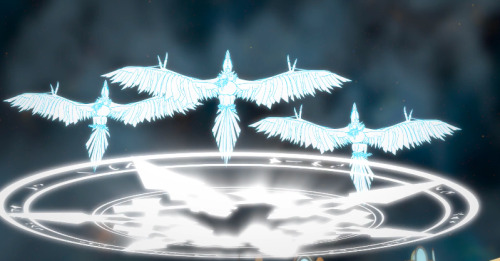
The focus on transformation that is part of the life cycle of a swan (ugly ducking to beautiful bird) is also perhaps symbolic of Winter’s internal development; this volume, she learned to fly on her own, growing up and shedding the need for father figures completely. She’s now able to fly (literally) freely and to save her people. But we will see; the connection is less strong here.
Yellow Stage: Pelican (Hazel Rainart)
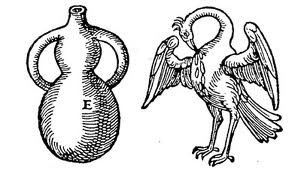
Due to the previous three all having links to a maiden, I wonder if the summer maiden will somehow be connected to pelican imagery, but for now, my inclination is to say that Hazel displays traits of the pelican as well, though there may be another person associated at some point.
The pelican’s notable accomplishment is to stab its own breast and nourish its young with its own blood. It is a symbol of sacrifice. Hazel sacrifices himself to save the children: Emerald, Oscar, Jaune, Yang, and Ren. He does so by stabbing himself in the chest with numerous dust types, combining all sorts of elements (key to alchemy).
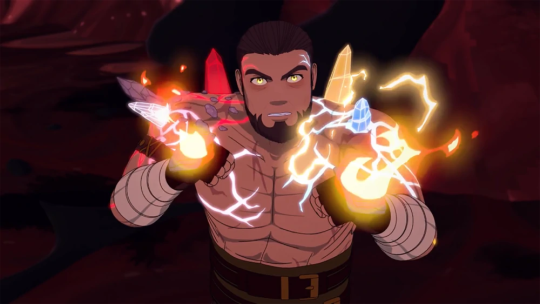
Red Stage: Phoenix (?)
This one remains to be determined. It could well could be Cinder (I mean, look at her name), plus the bird characters have thus far been adults like she is and possibly have a maiden association.
But it could also be Mercury, because of his association with fire and specifically with burning his “nest” as the phoenix does. When Cinder and Emerald find him, he’s burned his home.

Plus, I think it’s pretty obvious Mercury will either get his semblance back or develop a new one, and it’s most likely going to be related to flying given his emblem and allusion. It would also fit with his having prosthetic legs: he doesn’t need them fixed, and his losses don’t make him any less human. It’s always been within his soul to fly.
Ooooor the phoenix could be connected to Oscar, because of its association with the sun. It’s really too soon to say. ¯\_(ツ)_/¯
#rwby alchemy#rwby meta#rwby speculation#cinder fall#mercury black#oscar pine#qrow branwen#raven branwen#robyn hill#winter schnee#alchemy#hazel rainart#rwby theory#this meta is not perfect#but i was tired of wrestling with the birds
83 notes
·
View notes
Text
The K2 (2016)
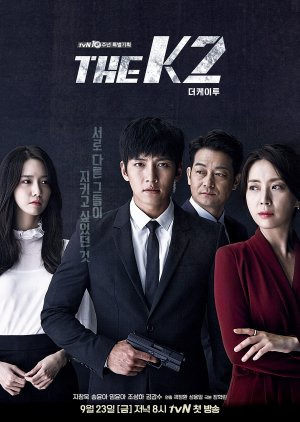
Summary
Kim Je Ha is a former mercenary soldier known as “K2” who suddenly turns into a fugitive when he is wrongfully accused of killing his girlfriend while he is serving in Iraq. He finds his way back to Korea and gets a job as a bodyguard for Choi Yoo Jin, the owner of JSS Security and the wife of Jang Se Joon, who is running for president.
Je Ha uses his new job to plan his revenge on Park Kwan Soo, the leader of the current ruling party and Se Joon’s rival, whom Je Ha believes ordered the murder of his girlfriend.
When Je Ha is assigned to guard Go An Na, the reclusive illegitimate daughter of Se Joon, they begin to develop feelings for each other. But what happens when the person who wants to harm An Na the most is Yoo Jin, Je Ha’s boss, and revenge ally? Where will Je Ha’s loyalty lay?
Review
An Action Hero but also establishes the fact that Strong Anti-Hero Females are a lasting trend
I saw some clips and action scenes of ‘The K2’ on YouTube and became interested in the show. I finished the show within a span of 1.5 days with ample sleep ofcourse. I have to say this is the most action packed K-drama I have seen thus far (DOTS, following second). I wanted to find out why the show is called K2, what is the significance. 15 mins into the drama and there is some punch packed action. My hopes rose, seeing how well it was choreographed. It’s safe to say the action didn’t disappoint and you find it packed around pretty much the whole drama. Although, the excessive pause made it unrealistic to some extent and fast pace of camera sometimes made it hard to follow through. I had to go back a few seconds sometimes to know what happened. The background music and ending credit song caught my attention from the first go. I searched out for it and found it was the main theme for the drama, furthermore the words that I wasn’t able to grasp (other than all of the dialogues in Korean) were in German. The words had a lot of meaning attached to the story and for a Kdrama having a ost composed in German was much surprising (my initial guess was spanish since that’s where the story began). To tell you the truth, it’s absolutely catchy and is still ringing in my ears. Most of the ost is instrumental and pretty good depicting the mood of the story. Soft for emotional scenes and thriller for suspense or action. Few episodes into it and you could guess with the main theme playing that you will witness some action or dynamic transition in plot. Coming to the story, it is not something entirely new to the universe. An agent (Kim Jeha) like no other, suffered a tradegy, gone rogue, fighting against the world but still being good and fair to the innocent. He fights for the right, wants revenge and along the way encounters love (Go Anna). However, the intricacies are what makes these stories and characters a bit more unique. It’s always interesting to watch these kinds of stories roll out every time. (Action with a purpose, as I call them are a favorite genre of mine). There are some things I absolutely loved about the drama. If there was a damsel in distress it wasn’t without a strong antagonist and that too a female (Choi Yoo Jin). Not often do we see this gender being given so much authority and control to move the story. I loved the character of Choi Yoo Jin even though she was evil, very evil but there was something about her that made her vulnerable and deserving of bit sympathy. Amazing acting by Song Yoon-ah, she ruled the show for me. She has so many layers and ultimately turns out to not so bad a character. Infact, she is better off than likes of Mr. Jang (father of Go Anna). I wanted to like this character, giving reasons for his shitty behavior of a playboy or towards his own daughter (he still loves her mother, he is trying to protect his own daughter) but even after his whole sacrifice at the end I haven’t been able to like him. I understand that his political career was the only thing he had left and it was to avenge his love. But you need to draw a line and not hurt and put the only thing you could possibly love through danger and much emotional turmoil again and again. The character of Go Anna played by Im Yoon-ah is much in controversy. Some say her acting isn’t as strong as her kpop gig, some say she doesn’t compliment well with Ji Chan Wook and there is no chemistry, others say she has improved a lot. Well I have nothing to compare her with, neither her past works nor many actresses. I honestly found her acting well according to the role given to her. I felt the role demanded of her to show less emotions, to act aloof. I felt the sparks between Go Anna and Kim Jeha but I wish they burnt like fire, I wish for more scenes where the chemistry could be explored more. Nevertheless, it was great. I also enjoyed the love traingle between Kim Jeha, Go Anna and Choi Yoo Jin. It touched upon a restricted topic of older woman loving a young guy. From the first go I felt that Choi Yoo Jin started liking Kim Jeha but
it wasn’t very clear, the show makers deliberately kept it that way I guess and I loved it. The way she should stood strong, caught hold of her feelings amidst her goals and also the way she unfolded and exposed herself to Jeha. Coming to the titular character, Ji Chang Wook, he has done some amazing work. It was my first drama of Ji Chang Wook. I am completely mesmerised by his ability to induce intensity and comedy equally well into the scene. He has performed some amazing action and was truly the wolf of show. Few of my favourite scenes include the inital fight scene (episode 1), the car chase with Kim Jeha and Yoo Jin (episode 2), bathroom fight (episode 3), taking Anna to infirmary (episode 7), euroem and ding (episode 8), how Kim Jeha looks at Anna through CCTV and then his eye shades episode, all the tiny details make your heart melt, the ending (episode 16) and choi yoo jin’s role in it, she was literally the queen of the forest! After finishing the show, it was difficult for me to imagine any korean actor that I famously know of other than Ji Chang Wook to play K2. He has done sweet justice to his role. The drama kept me engrossed throughout and due to the suspense attached I was constantly on my feet. The only disappointment I have from the show is not being able to K2’s real name. The whole soundtrack of the show is so so good it be enough to make you want to watch the show. I love the soundtrack of the show so much that I usually have it playing on repeat. All in all, I love the show a lot and I do keep coming back to it. Why Watch it? - If you are looking for an action packed Kdrama - If you are a Ji Chang Wook fan - If you are a Im Yoon-ah fan - If you are a Song Yoon-ah fan, trust me she’s too good in this - If you like action entangled with romance and suspense - Amazing Ost - If you like female anti-heros who move the story forward
8 notes
·
View notes
Text
BBC's Merlin Season 1 Episode 3: The Mark of Nimue Analysis
*SPOILERS FOR THE WHOLE SHOW*
First off I always look fondly on this episode, mainly for Morgana being hilarious and epic, I mean she has the best line in the whole episode:
Arthur: You could get hurt
Morgana: So could you.... if you don't get out of my way
This episode is also fun and interesting from the perspectives of plot, characters and themes. Sorry, this is extremely long, I have a lot of opinions about Merlin.
Gwen and Merlin
This episode is in many ways about Gwen and Merlin's friendship, it is the driving force behind all of Merlin's actions within this episode and is the stepping stone for this show considering how to find a balance between acting for the greater good without suggesting that the ends justify the means.
Merlin and Gwen are first off just very sweet, their friendship is really characteristic of this show's representation of friendship overall, just genuine love and consideration for others. It is also self-sacrificing, that's one thing about the relationships in this show they are so self-sacrificing.
When Merlin says to Gwen "I didn't like to see you upset." It reveals a wonderful fact of Merlin's characterisation that I would argue stays consistent for the whole show. His motivation is always grounded in how much he cares for the people around him. He cares deeply about his friends and they are largely his reason for doing the things he does. This line is a wonderful parallel to in season 3 when Merlin decides to let Morgana die (after he accidentally trips her down the stairs), but then in the end he heals her because he couldn't watch everyone's grief. Merlin cannot separate his actions from the people he's doing them for, and he can't stand to see people hurt when he has the power to fix it because the people he loves are his motivation, they are the reason he wants a better world. This show does establish (as I'll discuss further down) that what seems immediately right (healing Gwen's father etc) isn't necessarily the right decision to make for the greater good. This is some ways always questions the validity of Merlin's motivations and his actions, but I'd argue it more seeks to find a balance. Besides a Merlin who didn't act motivated by his love for others is not a Merlin that could have helped Arthur build Camelot.
Medievalism: duty and social obligation
Quick disclaimer cause I'm touching on a more scholarly issue here that I have limited knowledge of, so I will undoubtedly make mistakes and this is my opinion. Everything I write is my opinion, but that's more obvious when I'm commenting on the themes of a fictional world rather than making a comment on actual fields of study which is what I'm doing here.
BBC's Merlin is an example of medievalism, it is an engagement with the medieval era (or ideas/images associated with it) for modern times. I honestly don't know that much about medievalism, or the medieval era, certainly not enough to make an extensive commentary on its representation in Merlin. One thing I would argue is that Merlin's representation of friendship has its roots in idealised views of the virtues of the medieval era. For many people the Middle Ages represents a time of duty and social obligation, this on one hand does lead to a stringent class divide but it also finds its idealisation in the sort of friendship represented by Merlin. The premise in most societies that place great value on social obligation is that the needs of the community outweigh the needs of the individual, that people should sacrifice themselves for the community as a whole. Every society places emphasis on this in different ways and to greater or lesser extents and our view of it as being prevalent in the medieval era is largely an idealisation based in some historical reality but also our own desires about what this era represents. There is a kind of social responsibility in the relationships in Merlin, there is a great emphasis on loyalty which is part of this idealisation. However, Merlin makes it more personal than is often depicted. We idealise social responsibility and obligation, it is often tied into the social roles of people such as loyalty to a king, or paying back debts of honour which is a form of social obligation. Merlin is more about friendship, it takes our idealisation of medieval social obligation and makes it the obligation and loyalty we owe to people who love us and who we love. I will always say that fundamentally Merlin as a show is about love, and it emphasises what we owe to people in our lives in a way I believe echoes idealisation of medieval loyalty.
This idea can also be seen in Arthur's fundamental trust of others, his fundamental assumption that everyone around him is not seeking to harm him, and that people are generally good. This ties a bit into the idea of social obligation. Arthur's idealised world is one in which people have bonds of social obligation towards each other, that people are seeking to act in the interests of the community. It's an idealisation, both of the medieval era but also an idealisation in Arthur's own head of the world he lives in.
Morgana and Gwen
Their relationship is somewhat expanded on in this episode, and they are just so sweet. Gwen gives Morgana flowers to cheer her up and its just lovely. They have a very genuine and close relationship. Morgana also has great respect for Gwen, for the work she does, and she treats her with respect.
Morgana: "If she was a sorceress, why would she kneel on the cold stone floor every morning if she could make these things happen with a snap of her fingers, like an idle king."
Aside from being one of Morgana's many quality burns towards Uther, this also illustrates one of her greatest characteristics, her empathy and genuine respect and admiration for what Gwen does everyday. She doesn't see the class divide in the same way Uther sees it or Arthur pretends to see it.
Also interesting note I heard in a Merlin podcast (I can't remember which episode), it could have been the episode about this episode. It's called Destiny and Chicken (you can listen to it on Spotify and anywhere else you find podcasts- they even did an interview of Bradley James who plays Arthur at one point), and its very good. But, they said something interesting about the paralleling between the relationship between Merlin and Arthur and the relationship between Morgana and Gwen. Both are fundamentally important and genuinely caring relationships for the character. However, for Morgana and Gwen (unlike Merlin and Arthur) the class divide remains much more in place, Gwen treats Morgana like her friend but she also treats her like her mistress in a way Merlin just doesn't with Arthur (especially not so early in the show when he's not so admiring of Arthur). This isn't to say their relationship is bad or has problems, its just different whilst still acting as a parallel. I'm not sure exactly the extent to which I agree or what this says overall in themes but its definitely interesting to think about.
Uther: "A Good and Terrible King."
This episode shows Uther at both his best and his worst which is always fun because Uther is a genuinely interesting character. I got the line from my favourite Merlin fanfiction Coronation by rageprufrock, which you should definitely read, I'll link it down the bottom, it's not too long so you can read it in half an hour. It's a character study of Arthur more than anything else and its amazing, wonderful and deeply poetic. Uther is not a huge part of this fanfic, its about Arthur's character and his relationship with Merlin and his kingdom, I'm not even sure he actually appears. This line though perfectly tapped into how I always felt about Uther so it connected:
"He's been a good and terrible father, a good and terrible king."
I often think in characterising Uther we do tend to villainise him to an extent which I personally don't find accurate. This is obviously just my opinion, and I have a tendency to think the best of people so more intensely negative views of Uther are very jarring for me. He did terrible things and I truly believe he is the ultimate villain of the show but he is very human and he could be a good king and he loved his children more than anything else. We cheapen Merlin's point if we cast Uther as pure evil, everyone is capable of evil just as much as goodness. Uther is the tragedy (like Morgana) of a person who could have been good or at least halfway decent corrupted and destroyed by his own hate and ignorance. That's the point of the parallels between Uther and Morgana, we love Morgana and she was capable of so much good, but she corrupted herself with hate.
Onto this episode, Uther shows both his capability and goodness as a king in this episode as well as his hatred and ignorance. Uther's initial reaction to the fact that the plague is caused by magic is a concern about his own authority, which isn't entirely unfounded, but does reveal a huge priority of his which is control. He fears not being able to control, that's were his cruelty as a father comes from and to some extent his opposition to magic. This does not show Uther in the best light, but his actions later in regards to dealing with the plague show a decent king who cares about his people. This scene in which he tells Arthur to shut off the lower town perfectly illustrates this:
Arthur: But what about the people who live there
Uther: Don't you think I haven't considered it? What else can I do? I have to protect the rest of the city
In this situation Uther is right, there is very little other choice, he's making a hard call but it's one he has to make, and he seems genuinely distressed at having to make it. He does care about his people's well being, and he feels the burden of their protection, he can be a good King. Much of Arthur's story is in breaking away from the legacy of Uther, and rightly so, but Uther also taught him many things and one of those things is the duty Arthur has towards his people, it's a duty he takes even more seriously than Uther, but nonetheless he learnt it from him.
This however, as I've hinted, is not the whole story of this episode, Uther is also shown at his worst, and his worst is his ignorance and prejudice towards magic. He is willing to sacrifice justice and even sacrifices logical thought to his blind persistence that magic is evil.
Arthur: She's right Father. You hear the word magic you no longer listen.
Uther: You saw it for yourself, she used enchantments.
Arthur: Yes, maybe. To save her dying father, that doesn't make her guilty of creating a plague. One's the act of kindness, of love, the other of evil. I don't believe evil's in this girl's heart
Aside from what this says about Arthur. Arthur's comment about Uther hits right to the point of things "you hear the word magic you no longer listen". You no longer listen implies its a choice, and it is. Uther has made the choice for the last 20 years to choose to go on a dogmatic campaign of hate against magic because its easier than considering the alternative, that he was complicit in his wife's death. What Uther says immediately after "there are dark forces threatening this kingdom." is the argument used by so many people throughout history, used to justify so much hate. That there is an evil out there threatening the stability of life, that the world must be controlled and people have to live a certain way or risk destroying their own lives. It's an argument that justifies campaigns of hate and makes them personal to ordinary people who usually wouldn't care, and it is always a lie, that's not how the world works.
This episode thus shows Uther at his best and his worst, both a dutiful king and a stubborn tyrant. It's a tragedy of what he could of been, and shows how twisted up people can become when they justify their decisions with hate and fear.
Arthur
This is the first episode where Arthur really opposes Uther, he directly questions Uther's indiscriminate hatred of magic, and an episode where he realises to an extent he perhaps hadn't before some of the ways in which Uther has failed as a king. He also consciously acts in deception of Uther, because he can see Uther can't see sense. Arthur shows far more nuance of view than Uther does, understanding (even whilst still accepting as he will for a long time that magic is dangerous and it corrupts) that using magic doesn't make you automatically evil. To see the world the way Uther does is a conscious choice, you have to choose to be blind to the virtues of every apparent magic user you come across, you have to believe harmless spells are the signs of greater evil. Arthur is not someone who lets his own cowardice blind himself to reality, and so his worldview can see far more nuance than Uther can.
"One's the act of kindness, of love, the other of evil. I don't believe evil's in this girl's heart."
He further has a very positive view of others, Arthur will always see the good in people and that is a great strength in my view. In a lot of versions of the story Arthur's not just inspiring because he's good but because he assumes others are good too, he trusts people to do the right thing and I do believe that, that can inspire people to do the right thing. It's funny in Merlin Arthur's trust gets betrayed so many times but it never really hardens his heart, he continues to trust people no matter how many times he gets betrayed. This can be seen in his perception of Guinevere here, he will not assume she is evil because she has made a mistake, he can see the virtue in her actions, and he will assume goodness until proven otherwise. Innocent until proven guilty, in other words. It's its own form of justice, a justice Uther is forgetting, its a tenant of many legal systems and its a tenant Arthur clearly supports.
Arthur is also seeing his role as the king of Camelot in creating a Camelot that he would like to live in.
"Yes I am yet to be king, and I don't know what type of king I will be. But I do have a sense of the type of Camelot I would wish to live in. It would be where the punishment fits the crime."
It's not the Camelot he would wish to rule, its the Camelot he would wish to live in. Arthur wants to live in a just world, he wants his people to be treated with justice just as he would like to be treated with justice. This further illustrates that unlike Uther he is not letting anger or ignorance blind him to reality, he wants the world he lives in to be fair without exception.
Finding the Balance between The Greater Good and The Immediate Good
The Greater Good is a tricky concept, you can justify any amount of cruelty if it will lead to good later on, but do the ends justify the means? It's not really a question its ever possible to provide a definitive answer for. It's easy to say that they don't, that you should just do the right thing, the nice thing, the good thing in the moment but actions have consequences and doing the good thing all the time (especially in a position where thousands of lives depend on you) is not usually possible. Merlin tackles this theme, I believe, quite well, trying to find a balance between acting for the greater good and acting with what is immediately good, and this episode is a good example.
In a just and fair world you would be able to do good all the time, but this is not the case for everything, though you should never use the worlds not fair as an argument for not doing good things but I digress. Merlin's decision to save Gwen's father ultimately backfires on Gwen because the world is not fair, the world Uther has created mean even these acts of love are punishable with death. Because, for Uther, magic is magic, and magic is evil. Gaius was, in this situation, ultimately right, Merlin can't always do what is easy and what feels right because the consequences may not be good. In other matters like closing off the lower town, Arthur's initial response is concern for the people who live their, but Uther's right he has to make this one tough decision because otherwise he risks the whole city.
However, Uther's attitude to Gwen (aside from revealing his own stubbornness and prejudice) is an example of the greater good taken too far. He has absolutely no evidence that killing Gwen will stop this plague, but he's making that sacrifice anyway because it might, that is not justice or fair or anything resembling goodness. And he justifies his decisions with what I've already said is an age old argument- "These decisions must be made. There are dark forces threatening this kingdom." This is just another version of any easy choice, acting without regard to the greater good is an easy choice but so is ignoring what is immediately right in pursuit of some ambiguous goodness. He's confusing his own weakness and ignorance for strength.
The point Merlin is, I believe trying to make is that there must be a balance. Sometimes you have to pursue the greater good, but the ends don't really justify the means.
There is a reason Arthur and Merlin will create the Camelot of legend and Uther and Gaius don't, Merlin and Arthur aren't going to sacrifice their own goodness for the sake of the greater good. Merlin for one ensures Arthur never has to, its sad but Merlin in many ways makes the harsh and cruel decisions that Arthur never has to make. However, he also often doesn't make those decisions. He reaches a point where he wants to let people die, but he never actively attempts to kill Morgana or Mordred by himself unless it is an absolute in the moment choice between them and Arthur, and even though there is plenty of moral ambiguity about that and plenty of debates you can have about that. Fundamentally the point remains, Uther would have killed them and that's why he could never be the king Arthur would be or the influence for decency Merlin would be, the ends don't ever entirely justify the means. Besides if Merlin had thought that and killed Mordred and Morgana for their possible futures he would not have been the decent person he was and he could not have helped Arthur build a good Camelot, Camelot would not have existed if Merlin had acted entirely with the greater good in mind to ensure Camelot's future.
Other Stuff
Gwen's scene in the cell is so terribly sad, she's trying to be brave and her final request to Merlin is just so sad, "Remember me." She's so young and its the injustice and cruelty of Uther's kingdom that's condemning her, his own blindness to anything involving magic. We all want to be remembered don't we, especially when you die so young that you've barely had the chance to live. -----Also Guinevere will be remembered, she is a legend so there's something very bittersweet in this. She is not forgotten, then or ever
It's funny watching back to season 1, Merlin spends a lot of the time complaining about how Arthur will never recognise him for who he is. He wants recognition. But by the end of the show, yes of course he'd like recognition but he's learnt to just put up with never getting it. His priorities have changed so much.
There's this thing that happens a lot in season 1 and 2 (and I think a bit in season 3 but its less funny then) where Morgana persuades Arthur to do things by insulting him and its the funniest thing ever, and the first instance of it is here. I like to call these her 'epic sibling powers' cause they are just such siblings and its hilarious every time
"You are one side of the coin, Arthur is the other."- Kilgaharrah--> Just, yes.
Also when Arthur gets Merlin out of when Merlin confesses to being a sorcerer—> he's obviously making stuff up on the spot—> like he might sort of believe it (the stuff about Gwen) but fundamentally he's just trying to protect him without really knowing for sure why Merlin's lying
"One day people won't believe what an idiot you were."- Gaius--> Fun little nod to the audience who know Merlin of legend (as nothing like the BBC Merlin)
Also at this point we don't know why Uther really banned magic so there is an element of moral greyness to it all. We know magic's not evil, we know Uther went too far but at this point there is still a question about 'how too far' did he go?
Coronation by Rageprufrock (seriously read it. It's amazing): https://archiveofourown.org/works/5749
#merlin#bbc merlin#merthur#arthurian legend#arthur pendragon#king arthur#merlin bbc#Morality#the greater good#sacrifice#magic#two sides of the same coin#guinevere pendragon#gwen pendragon#morgana#morgana pendragon#gaius#uther pendragon#bbc uther#camelot#analysis#merlin analysis#merlin duty
21 notes
·
View notes